#decade of sustainable energy for all
Text
(Part 2) Global stocktaking marking the completion of the UN Decade of Sustainable Energy for All to further accelerate the implementation of SDG 7 of the 2030 Agenda for Sustainable Development - General Assembly, Sustainability Week, 78th session.
Thematic Debate 2: Addressing energy's interlinkages and strengthening means of implementation and partnerships
Closing segment
Energy is an essential ingredient for getting the world on track towards meeting the SDGs and the objectives of the Paris Agreement on climate change. SDG 7, which calls for access to affordable, reliable, sustainable and modern energy for all, is inextricably linked to many other SDGs and its targets, including poverty eradication, food security, health, education, prosperity, gender equality, employment, transport, ocean, clean water and sanitation, as well as gender equality and the empowerment of women, youth and children.
The global stocktaking will bring together high-level representatives from Member States and other leaders from all regions. The meeting will be open to the United Nations system, ECOSOC-accredited non-governmental organizations, and other relevant stakeholders.
The goal of the global stocktaking is to review progress achieved at the end of the UN Decade of Sustainable Energy for All, 2014-2024, and to raise ambition and accelerate action towards attaining SDG 7 by catalyzing innovative solutions, investments and multi-stakeholder partnerships.
Watch the (Part 2) Global stocktaking marking the completion of the UN Decade of Sustainable Energy for All to further accelerate the implementation of SDG 7 of the 2030 Agenda for Sustainable Development - General Assembly, Sustainability Week, 78th session.


#high-level representatives#UN Economic and social council#ungasustainabilityweek#choosesustainability#UNGA78#decade of sustainable energy for all#SE4LL#ChooseSustainability#energy sector#energy security#energy services#ReliableEnergy#stakeholder partnerships#stakeholders#greenenergy#partnerships#sdg7#energy#innovative solutions#PowerGrid#electricity#investment#sustainable energy#affordable energy#clean energy#energy transition
0 notes
Text
No paywall version here.
"Two and a half years ago, when I was asked to help write the most authoritative report on climate change in the United States, I hesitated...
In the end, I said yes, but reluctantly. Frankly, I was sick of admonishing people about how bad things could get. Scientists have raised the alarm over and over again, and still the temperature rises. Extreme events like heat waves, floods and droughts are becoming more severe and frequent, exactly as we predicted they would. We were proved right. It didn’t seem to matter.
Our report, which was released on Tuesday, contains more dire warnings. There are plenty of new reasons for despair. Thanks to recent scientific advances, we can now link climate change to specific extreme weather disasters, and we have a better understanding of how the feedback loops in the climate system can make warming even worse. We can also now more confidently forecast catastrophic outcomes if global emissions continue on their current trajectory.
But to me, the most surprising new finding in the Fifth National Climate Assessment is this: There has been genuine progress, too.
I’m used to mind-boggling numbers, and there are many of them in this report. Human beings have put about 1.6 trillion tons of carbon in the atmosphere since the Industrial Revolution — more than the weight of every living thing on Earth combined. But as we wrote the report, I learned other, even more mind-boggling numbers. In the last decade, the cost of wind energy has declined by 70 percent and solar has declined 90 percent. Renewables now make up 80 percent of new electricity generation capacity. Our country’s greenhouse gas emissions are falling, even as our G.D.P. and population grow.
In the report, we were tasked with projecting future climate change. We showed what the United States would look like if the world warms by 2 degrees Celsius. It wasn’t a pretty picture: more heat waves, more uncomfortably hot nights, more downpours, more droughts. If greenhouse emissions continue to rise, we could reach that point in the next couple of decades. If they fall a little, maybe we can stave it off until the middle of the century. But our findings also offered a glimmer of hope: If emissions fall dramatically, as the report suggested they could, we may never reach 2 degrees Celsius at all.
For the first time in my career, I felt something strange: optimism.
And that simple realization was enough to convince me that releasing yet another climate report was worthwhile.
Something has changed in the United States, and not just the climate. State, local and tribal governments all around the country have begun to take action. Some politicians now actually campaign on climate change, instead of ignoring or lying about it. Congress passed federal climate legislation — something I’d long regarded as impossible — in 2022 as we turned in the first draft.
[Note: She's talking about the Inflation Reduction Act and the Infrastructure Act, which despite the names were the two biggest climate packages passed in US history. And their passage in mid 2022 was a big turning point: that's when, for the first time in decades, a lot of scientists started looking at the numbers - esp the ones that would come from the IRA's funding - and said "Wait, holy shit, we have an actual chance."]
And while the report stresses the urgency of limiting warming to prevent terrible risks, it has a new message, too: We can do this. We now know how to make the dramatic emissions cuts we’d need to limit warming, and it’s very possible to do this in a way that’s sustainable, healthy and fair.
The conversation has moved on, and the role of scientists has changed. We’re not just warning of danger anymore. We’re showing the way to safety.
I was wrong about those previous reports: They did matter, after all. While climate scientists were warning the world of disaster, a small army of scientists, engineers, policymakers and others were getting to work. These first responders have helped move us toward our climate goals. Our warnings did their job.
To limit global warming, we need many more people to get on board... We need to reach those who haven’t yet been moved by our warnings. I’m not talking about the fossil fuel industry here; nor do I particularly care about winning over the small but noisy group of committed climate deniers. But I believe we can reach the many people whose eyes glaze over when they hear yet another dire warning or see another report like the one we just published.
The reason is that now, we have a better story to tell. The evidence is clear: Responding to climate change will not only create a better world for our children and grandchildren, but it will also make the world better for us right now.
Eliminating the sources of greenhouse gas emissions will make our air and water cleaner, our economy stronger and our quality of life better. It could save hundreds of thousands or even millions of lives across the country through air quality benefits alone. Using land more wisely can both limit climate change and protect biodiversity. Climate change most strongly affects communities that get a raw deal in our society: people with low incomes, people of color, children and the elderly. And climate action can be an opportunity to redress legacies of racism, neglect and injustice.
I could still tell you scary stories about a future ravaged by climate change, and they’d be true, at least on the trajectory we’re currently on. But it’s also true that we have a once-in-human-history chance not only to prevent the worst effects but also to make the world better right now. It would be a shame to squander this opportunity. So I don’t just want to talk about the problems anymore. I want to talk about the solutions. Consider this your last warning from me."
-via New York Times. Opinion essay by leading climate scientist Kate Marvel. November 18, 2023.
#WE CAN DO THIS#I SO TRULY BELIEVE THAT WE CAN DO THIS#WE CAN SAVE OURSELVES AND THE WORLD ALONG WITH US#climate crisis#united states#climate change#conservation#hope posting#sustainability#climate news#climate action#climate emergency#fossil fuels#global warming#environmentalism#climate hope#solarpunk#climate optimism#climate policy#earth#science#climate science#meteorology#extreme weather#renewable energy#solar power#wind power#renewables#carbon emissions#climate justice
33K notes
·
View notes
Text
while everyone's rightfully talking about oppenheimer and its flaws regarding the erasure of japanese and native american voices regarding nuclear testing and detonations, i'd like to bring up the fact that pacific islanders have also been severely impacted by nuclear testing under the pacific proving grounds, a name given by the US to a number of sites in the pacific that were designated for testing nuclear weapons after the second world war, at least 318 of which were dropped on our ancestral homes and people. i would like if more people talked about this.
important sections are bolded for ease of reading. i would appreciate this being reblogged since it's a bit alarming how few people know about this.
--
in 1946, the indigenous peoples of pikinni (the bikini atoll) were forcibly relocated off of their islands so that nuclear tests could be run on the atoll. at least 23 nuclear bombs were detonated on this inhabited island chain, including 20 hydrogen bombs. many pasifika were irreversibly irradiated, all of them were starved during multiple forced relocations, and the island chain is still unsafe to live on despite multiple cleanup attempts. there are several craters visible from space that were left on the atoll from nuclear testing.
the forced relocation was to several different small and previously uninhabited islands over several decades, none of which were able to sustain traditional lifestyles which directly lead to further starvation and loss of culture and identity. there is a reason that pacific islanders choose specific islands to inhabit including access to fresh water, food, shelter, cloth and fibre, climate, etc. and obviously none of these reasons were taken into account during the displacements.
200 pikinni were eventually moved back to the atoll in the 1970s but dangerous levels of strontium-90 were found in drinking water in 1978 and the inhabitants were found to have abnormally high levels of caesium-137 in their bodies.
--
i'm going to put the rest of this post under a readmore to improve the chances of this being reblogged by the general public. i would recommend you read the entirety of the post since it really isn't long and goes into detail about, say, entire islands being fully, utterly destroyed. like, wiped off of the map. without exaggeration, entire islands were disintegrated.
--
as i just mentioned, ānewetak (the eniwetok atoll) was bombed so violently that an entire island, āllokļap, was permanently and completely destroyed. an entire island. it's just GONE. the world's first hydrogen bomb was tested on this island. the crater is visibly larger than any of the islands next to it, more than a mile in diameter and roughly fifteen storeys deep. the hydrogen bomb released roughly 700 times the energy released during the bombing of hiroshima. this would, of course, be later outdone by other hydrogen bombs dropped on the pacific, reaching over 1000 times the energy released.
one attempt to clean up the waste on ānewetak was the construction of a large ~380ft dome, colloquially known as the tomb, on runit island. the island has been essentially turned into a nuclear waste dump where several other islands of ānewetak have moved irradiated soil to and, due to climate change, rising seawater is beginning to seep into the dome, causing nuclear waste to leak out. along with this, if a large typhoon were to hit the dome, there would be a catastrophic failure followed by a leak of nuclear waste into the surrounding land, drinking water, and ocean. the tomb was built haphazardly and quickly to cut costs.
hey, though, there's a plus side! the water in the lagoon and the soil surrounding the tomb is far more radioactive than the currently contained radioactive waste. a typhoon wouldn't cause (much) worse irradiation than the locals and ocean already currently experience, anyway! it's already gone to shit! and who cares, right, the only ""concern"" is that it will just further poison the drinking water of the locals with radioactive materials. this can just be handwaved off as a nonissue, i guess. /s
--
at least 36 bombs were detonated in the general vicinity of kiritimati (christmas island) and johnson atoll. while johnson atoll has seemingly never been inhabited by polynesians, kiritimati was used intermittently by polynesians (and later on, micronesians) for several hundred years. many islands in the pacific were inhabited seasonally and likewise many pacific islanders should be classified as nomadic but it has always been convenient for the goal of white supremacy and imperalism to claim that semi-inhabited areas are completely uninhabited, claimable pieces of terra nullius.
regardless of the current lack of inhabitants on these islands, the nuclear detonations have caused widespread ecological damage to otherwise delicate island ecosystems and have further spread nuclear fallout across the entirety of the pacific ocean.
--
while the marshall islands, micronesia, and the surrounding areas of melanesia and polynesia were (and still are) by far the worst affected by these atrocities, the entirety of the pacific has been irradiated to some extent due to ocean/wind currents freely spreading nuclear fallout through the water and air. all in all, at least 318 nuclear bombs were detonated across the pacific. i say "at least" because these are just the events that have been declassified and frankly? i wouldn't be shocked to find out they didn't stop there.
please don't leave the atomic destruction of the pacific out of this conversation. we've been displaced, irradiated, murdered, poisoned, and otherwise mass exterminated by nuclear testing on purpose and we are still suffering because of it. many of us have radiation poisoning, many of us have no safe ancestral home anymore. i cannot fucking state this enough, ISLANDS WERE DISINTEGRATED INTO NONEXISTENCE.
look, this isn't blaming people for not talking about us or knowing the extent of these issues, but it's... insidiously ironic that i haven't seen a single post that even mentions pacific islanders in a conversation about indigenous voices/voices of colour being ignored when it comes to nuclear tests and the devastation they've caused.
#ask to tag. i understand this is heavy and i've tried to tag accordingly#oppenheimer#oppenheimer 2023#pasifika#micronesian#melanesian#polynesian#pacific islands#indigenous#pacific ocean#pacific proving grounds#racism#imperialism#genocide#nuclear weapons#indigenous genocide#nuclear#nuclear bomb#us imperialism#displacement#nuclear imperialism
5K notes
·
View notes
Text
« To mention the global loss of biodiversity, that is to say, the disappearance of life on our planet, as one of our problems, along with air pollution or ocean acidification, is absurd—like a doctor listing the death of his patient as one symptom among others.
The ecological catastrophe cannot be reduced to the climate crisis. We must think about the disappearance of life in a global way. About two-thirds of insects, wild mammals and trees disappeared in a few years, a few decades and a few millennia, respectively. This mass extinction is not mainly caused by rising temperatures, but by the devastation of natural habitats.
Suppose we managed to invent clean and unlimited energy. This technological feat would be feted by the vast majority of scientists, synonymous in their eyes with a drastic reduction in CO2 emissions. In my opinion, it would lead to an even worse disaster. I am deeply convinced that, given the current state of our appetites and values, this energy would be used to intensify our gigantic project of systemic destruction of planetary life. Isn't that what we've set out to do—replace forests with supermarket parking lots, turn the planet into a landfill? What if, to cap it all, energy was free?
[...C]limate change has emerged as our most important ecological battle [...] because it is one that can perpetuate the delusional idea that we are faced with an engineering problem, in need of technological solutions. At the heart of current political and economic thought lies the idea that an ideal world would be a world in which we could continue to live in the same way, with fewer negative externalities. This is insane on several levels. Firstly because it is impossible. We can't have infinite growth in a finite world. We won't. But also, and more importantly, it is not desirable. Even if it were sustainable, the reality we construct is hell. [...]
It is often said that our Western world is desacralised. In reality, our civilisation treats the technosphere with almost devout reverence. And that's worse. We perceive the totality of reality through the prism of a hegemonic science, convinced that it “says” the only truth.
The problem is that technology is based on a very strange principle, so deeply ingrained in us that it remains unexpressed: no brakes are acceptable, what can be done must be done. We don't even bother to seriously and collectively debate the advisability of such "advances". We are under a spell. And we are avoiding the essential question: is this world in the making, standardised and computed, overbuilt and predictable, stripped of stars and birds, desirable?
To confine science to the search for "solutions" so we can continue down the same path is to lack both imagination and ambition. Because the “problem” we face doesn't seem to me, at this point, to be understood. No hope is possible if we don't start by questioning our assumptions, our values, our appetites, our symbols... [...] Let's stop pretending that the numerous and diverse human societies that have populated this planet did not exist. Certainly, some of them have taken the wrong route. But ours is the first to forge ahead towards guaranteed failure. »
— Aurélien Barrau, particle physicist and philosopher, in an interview in Télérama about his book L'Hypothèse K
2K notes
·
View notes
Note
Tell me about the olm?
olms are blind translucent salamanders that spend their entire lives in caves. they're about a foot long and can go literally years without twitching a single muscle. they only breed something like once a decade, and they can live for over 70 years.

aaaand they're also one of the biggest organisms to be totally cave-bound!
see, the thing about caves is that there's... not a whole lot going on. once you go pass through the Bat Zone and enter the parts of the cave where the only residents spend their entire lives there, you discover this:

yeah. these chambers have spent literally thousands of years away from the sun in unchanging darkness, so there's really not many nutrients passing through the food web here.
pretty much only the tiniest mere dribblings of nutrients are occasionally washed through underground rivers that pass through the cave, sustaining tiny cave fish and invertebrates. and also the olm, giant among its cave siblings.

so because there is so very little food and nutrimants around, olms have adapted to just. not use energy. at all.
they don't expend ANY energy at all unless it's to sip up a passing particle in the water. they are as still as statues otherwise, biding their time.
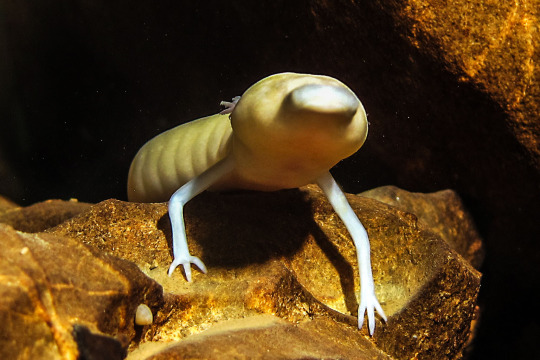
oh, I do NOT like looking at it head on.
and once they've built up enough reserves, they'll go find a similarly motivated partner to go create some little olms with! but then it's back to a decade of stillness in the dark for Olm.
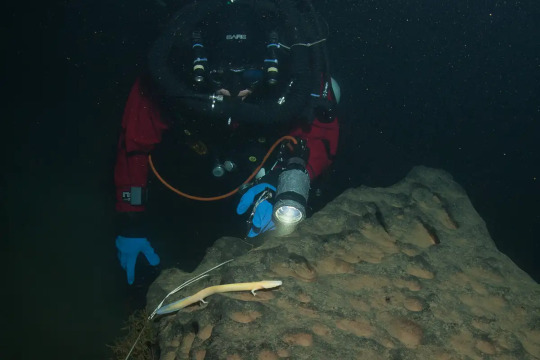
it's okay, though. they've got time.
7K notes
·
View notes
Text
Good News - May 22-28
Like these weekly compilations? Support me on Ko-fi! Also, if you tip me on Ko-fi, at the end of the month I'll send you a link to all of the articles I found but didn't use each week - almost double the content!
1. Scientists Invent Healthier More Sustainable Chocolate
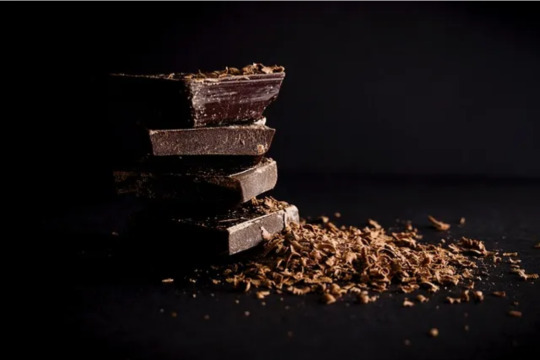
“The new chocolate recipe from researchers at ETH Zurich uses more materials from the cocoa pod that are usually discarded, including more of the pulp as well as the inner lining of the husk, known as the endocarp. […] The resulting chocolate also [was “deliciously sweet” and] had 20% more fibre and 30 percent less saturated fat than average European dark chocolate[, and] it could enable cocoa farmers [to] earn more from their crops.”
2. Vermont Is Coming for Big Oil, Making It Pay for Decades of Climate Pollution
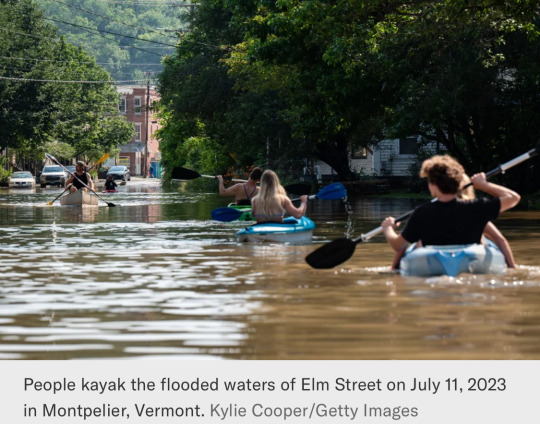
“Legislators in Montpelier are on the brink of enacting the "Climate Superfund Act," modeled after the federal Superfund law, that seeks to make oil, gas and coal companies pay for damages linked to historical greenhouse gas emissions. […] Companies would be held liable for the costs associated with […] floods and heat waves, along with losses to biodiversity, safety, economic development and anything else the treasurer deems reasonable[, that were caused by their emissions].”
3. Important bird habitat now protected in the Rocky Mountain Trench
“Grassland-reliant species in the Rocky Mountain Trench now have more protected habitat thanks to a new [270-hectare] conservation area near Cranbrook. […] About one-third of the Skookumchuck Prairie Conservation Area is forested[…,] Most of the site is a dry grassland[…, and] Three hectares of wetlands add to the landscape diversity and offer crucial benefits to wildlife and water systems in the area. This conservation gem also provides habitat for endangered American badger and excellent winter range for elk, mule deer and white-tailed deer.”
4. Lemur Week marked by 70th breeding success
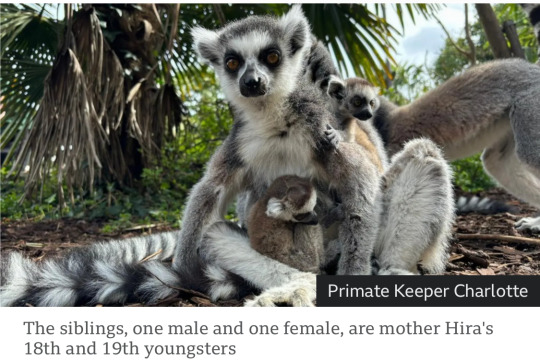
“A wildlife park has celebrated its 70th lemur breeding success ahead of a week raising money to help save the endangered primates. […] The park's open-air Madagascar exhibit is home to 31 free-roaming lemurs and was officially opened in 2008. […] Females are only sexually receptive for just one or two days a year, leaving a small window of opportunity for males to father offspring. […] The two playful siblings, one female and one male, were born to father Bernard and mother Hira.”
5. Innovative material for sustainable building
“Researchers introduce a polymer-based material with unique properties. This material allows sunlight to enter, maintains a more comfortable indoor climate without additional energy, and cleans itself like a lotus leaf. The new development could replace glass components in walls and roofs in the future.”
6. Isle of Wight eagles don't pose threat to lambs as feared
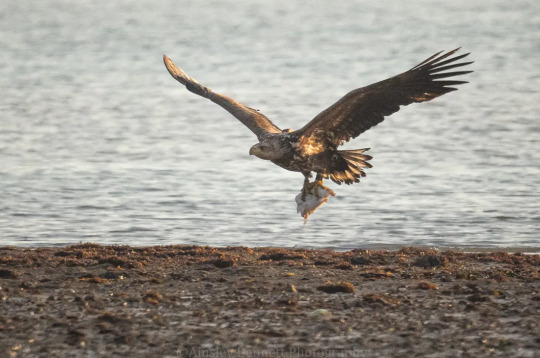
“While there had previously been fears that the eagles would feed on livestock, such as lambs, the project has found no evidence of this. [… “W]hite-tailed eagles effectively steal meals from other predatory birds[, which is] a really important ecological role that had been lost within the landscape and is being restored.” [… The birds’] population was boosted by a chick last year – the first time the species has bred in England in 240 years.”
7. Breakthrough discovery uses engineered surfaces to shed heat
“Cheng's team has found a way to lower the starting point of the [Leidenfrost] effect by producing a surface covered with micropillars. […] The discovery has great potential in heat transfer applications such as the cooling of industrial machines and surface fouling cleaning for heat exchangers. It also could help prevent damage and even disaster to nuclear machinery.”
8. New malaria vaccine delivered for the first time

“A total of 43,000 doses arrived by air today from UNICEF, and another 120,000 are scheduled to show up in the coming days. […] They're the first vaccines designed to work against a human parasite. […] Across four African countries, these trials showed a 75% reduction in malaria cases in the year following vaccination of young children. […] The Serum Institute of India, who will be manufacturing the new vaccine, says a hundred million doses will likely be available to countries by the middle of next year.”
9. Urban gardening may improve human health: Microbial exposure boosts immune system
“"One month of urban indoor gardening boosted the diversity of bacteria on the skin of the subjects and was associated with higher levels of anti-inflammatory cytokines in the blood. The group studied used a growing medium with high microbial diversity emulating the forest soil," [… whereas] the control group used a microbially poor peat-based medium. [… N]o changes in the blood or the skin microbiota were seen. […] “This is the first time we can demonstrate that meaningful and natural human activity can increase the diversity of the microbiota of healthy adults and, at the same time, contribute to the regulation of the immune system."”
10. Cities Are Switching to Electric Vehicles Faster Than Individuals

“[M]ost large cities have adopted some kind of climate goal, and some of them are buying EVs for their municipal fleets at a faster rate than the general public. And that progress could speed up as more EVs enter the market and as cities get educated about grant funding and tax incentives that were passed over the last four years.”
May 15-21 news here | (all credit for images and written material can be found at the source linked; I don’t claim credit for anything but curating.)
#hopepunk#good news#chocolate#sustainability#farming#health#vermont#big oil#oil companies#climate change#cooling#technology#nuclear#malaria#vaccine#africa#unicef#eagles#livestock#england#birds#electric vehicles#glass#energy efficiency#habitat#conservation#lemur#zoo#gardening#urban gardening
227 notes
·
View notes
Text
It's hard to drop the mask after so many decades of keeping it up (talking autistic masking here, meaning pretending to be allistic--and yeah, I was masking long before I knew I was autistic, because I knew that "fitting in" required me to behave in ways that did not come naturally to me) but I have noticed (and @thesurestthing has confirmed through observation) that without the strain of forcing myself to make eye contact, letting myself stim, etc., I'm much calmer, more relaxed, and more patient. It is jaw-dropping to realize how much of a stress and strain and energy drain it was to keep up that mask all the time.
And I'm discovering that if I just tell people, "Hey, if you notice me not making eye contact, it's nothing personal; I'm autistic, and sustained eye contact is hard for me," they're generally like, "Oh, okay, no problem."
677 notes
·
View notes
Text
A short reminder that Russia is imperialist, has been imperialist for a long time, and there's no way around that fact.
Sections of the Western left have developed a narrative according to which Russia has been gradually surrounded by NATO and that supposedly "provoked" Putin. It's increasingly difficult to sustain the notion that Russia is simply "defending itself" after 24 February 2022, but the thing is - the invasion did not come out of the blue. One needs a different narrative to understand what Russia actually is: an aggressive imperialist power alongside other imperialisms.
So, a different narrative:
- 1994: Russia, with US support, acquires Ukrainian nuclear arsenal in exchange for the assurances to respect Ukraine's territorial integrity
- 1997: Russia acquires the Sevastopol naval base and almost all of the ships (82%, to be exact)... in exchange for the assurances to respect Ukraine's territorial integrity!
- 2004: Russia meddles in Ukrainian presidential elections, fighting hard to force an undemocratic fraudulent outcome, but fails
- Mid-to-late 2000s: As punishment for Ukraine electing Yushchenko, Russia uses energy blackmail, a form of economic coercion not very different from the IMF and World Bank lending and conditionality
- 2008: NATO refuses to adopt a roadmap towards Ukraine's membership and in effect postpones the decision indefinitely. Ukraine's security is in no way guaranteed, while Russia has already demonstrated the propensity to use coercion to force Ukraine to do its bidding
- 2009: Dmitry Medvedev, then president, writes to Yushchenko that "Russia does not pose and cannot pose any kind of threat to Ukraine", so seeking NATO membership is stupid. Yea, sure
- 2014: Russia, which "does not pose and cannot pose a threat to Ukraine"... annexes Crimea. Really, Dima?? I thought you were for real??
Of course, by annexing Crimea Russia not only makes all the previous statements that it "can never pose a threat to Ukraine" a ridiculous lie, but also breaks the 1994 memorandum and 1997 treaty. "We are the Kremlin. Our word is worth nothing"
- Crimea's annexation provokes armed separatism in Donbas that Russia supports and coordinates, including direct military command and control, and then completely subordinates Donbas "authorities", in effect occupying the region
- Ukraine's still not in NATO, its security is still in no way guaranteed, and the supplies of US weapons only begin in 2018. They are kept to a minimum... out of fear of provoking Russia!
- Nevertheless, on 24 February 2022 Russia launches a full-scale invasion to establish 100% control over all of Ukraine in one way or another. There is literally no military development on the ground that could have provoked the invasion. On Russia's part, it's a war of choice in exactly the same way the invasion of Iraq was a war of choice for the US in 2003.
Now, this is only the general outline. One should add Russia's drowning of Ukraine with spies and agents of influence, money to corrupt Ukrainian politicians and massive acquisition of Ukrainian assets to impose economic and political dependency.
These are well-known facts, but so many on the left refuse to see the story behind them. It's a story of decades of imperialist aggression, culminating in a war that cost 150,000 lives in 2022 alone. Any discussion of left-wing internationalism should begin with recognizing the reality of what Russia is and what it did.
#ukraine war#ukraine#imperialism#left#russian imperialism#russian ukrainian war#russia#policy#war#nato#russian chauvinism#anti-imperialism#history
816 notes
·
View notes
Text
Full Article Text:
The United Kingdom is facing dire food shortages, forcing prices to skyrocket, and experts predict this is only the beginning.
What's happening?
According to a report by The Guardian, extreme weather is wreaking havoc on crops across the region. England experienced more rainfall during the past 18 months than it has over any 18-month period since record-keeping began in 1836.
Because the rain hasn't stopped, many farmers have been unable to get crops such as potatoes, carrots, and wheat into the ground. "Usually, you get rain but there will be pockets of dry weather for two or three weeks at a time to do the planting. That simply hasn't happened," farmer Tom Allen-Stevens told The Guardian.
Farmers have also planted fewer potatoes, opting for less weather-dependent and financially secure crops. At the same time, many of the potatoes that have been planted are rotting in the ground.
"There is a concern that we won't ever have the volumes [of potatoes] we had in the past in the future," British Growers Association CEO Jack Ward told The Guardian. "We are not in a good position and it is 100% not sustainable," Ward added.
Why is it important?
English farmers aren't alone — people are struggling to grow crops worldwide because of extreme weather.
Dry weather in Brazil and heavy rain in Vietnam have farmers concerned about pepper production. Severe drought in Spain and record-breaking rain and snowfall in California have made it difficult for farmers to cultivate olives for olive oil. El Niño and rising temperatures cut Peru's blueberry yield in half last year. Everyone's favorite drinks — coffee, beer, and wine — have all been impacted by extreme weather.
According to an ABC News report, the strain on the agriculture industry will likely continue to cause food prices to soar.
If these were just isolated events, farmers could more easily adapt — bad growing seasons are nothing new. The problem is that rising temperatures are directly linked to the increasing amount of gases such as carbon dioxide and methane in the atmosphere.
Since the start of the Industrial Revolution, humans have burned dirty energy sources such as coal, oil, and gas, which release a significant amount of those gases. Our climate is changing so drastically that the 10 warmest years since 1850 have all occurred in the last decade.
"As climate change worsens, the threat to our food supply chains — both at home and overseas — will grow," Energy and Climate Intelligence Unit analyst Amber Sawyer told The Guardian.
What can we do about it?
"Fortunately, we know many ways we can make the food system more resilient while reducing food emissions. The biggest opportunity in high-income nations is a reduction in meat consumption and exploration of more plants in our diets," said Dr. Paul Behrens, an associate professor of environmental change at Leiden University in the Netherlands.
If we replace a quarter of our meat consumption with vegetables, we could cut around 100 million tons of air pollution yearly. It may seem strange to suggest eating more vegetables with the decline in crop production. However, reducing the land and water used for animal agriculture and diverting those resources to growing more produce would drastically help the declining food supply.
Growing our own food is also a great way to reduce our reliance on store-bought produce, and it can save you hundreds of dollars a year at the grocery store.
121 notes
·
View notes
Text
It was a while ago I read this tumblr post, which still comes to my mind every time I think about the future. It was explaining in an insightful way, how it's not a violent revolution that will bring forward the better future, it's slow and consistent change of our everyday life, of our habits, the resources we use and the way we go about achieving things. If we're hoping for a future where we're not dependent on capitalism, not destroying the environment, not robbed of our labour for a fraction of the money we need to survive, we'll have to slowly die capitalism out, by changing our own living habits.
If a sudden shift happened, and capitalism stopped functioning overnight, for most of the people that would be unsurvivable, all of the resources, food, jobs and life-sustaining services would stop. And we can't afford that. But, if instead we slowly backed away from it, generated alternatives, created communities and systems that can sustain us without capitalism, then it would only be a matter of time before capitalism is fully dead, with everyone alive, everyone safe. And this slow shift would be able to happen through decades and generations, and it would still be a great positive shift, with a future in sight. Capitalism offers no survivable future, seemingly ready to last as long as it can by destroying whatever is left from the environment and people alike, for the benefit of the few.
So let's see how we got here, or how I feel, looking back, we got here.
People used to be less dependent on a global system of distribution of resources, even just a 100 years ago; survival and trade skills were passed down in families and communities, and people would be able to make inside of their home and communities, a big percentage of things that we today would buy at the store. In those times there was no other way to gain those resources but by relying on people's knowledge, skill and labour. The future, however, promised a more convenient and easy way to gain all those resources, because they would be made by machines, and thus cheaper. And things kept coming in cheaper, for no visible labour required; you just needed to have money to buy them, which not everyone had.
But this too, would change as cheaper and cheaper things arrived, and it became less convenient to make those things yourself or within your community, and more convenient to just trade some money, and have it all be done for you. For people then, it could mean less energy spent on survival, more leisure time, more health and longer lifespan – except, it didn't, because the jobs that they needed to earn that money, tended to take all of that away. So still, there was a lot produced at home or within the communities, independent workshops and artist shops, so people within in the community would benefit from each other, instead of benefiting some faceless global corporation.
And now we know where this went; conveniences started lining up to the point where not having a certain convenience meant that you were below the norm. They sometimes got mixed up with inconveniences, but those inconveniences were 'necessary'. For instance, pollution became necessary, highways, huge trucks delivering goods, the oil industry, destruction of forests and habitats, exploitation of the poor, extinction of certain animals, and by the end of it, the climate change.
When I was born, my mother and grandmother still attempted to pass some skills that their mothers taught them; I remember being taught how to knit at the age of 5, the activity which at that age, seemed awfully tedious and was soon abandoned, and my grandmother showed me how to crochet, which I also soon forgot. After the age of small child, they both looked at the world, shrugged and decided 'she won't need it', and they have stopped trying to teach me any skills of the sort.
Buying things, rather than making them, already seemed the norm. People were readily telling you that you are stupid for trying to make something, when you could get it in the store, for very little money. Having animals at home, or growing food, was slowly getting replaced by buying it cheap, or buying tons of snacks, and biscuits and cakes, which now you could get pre-packaged, readily available to consume at your leisure. If it brought lots of waste from packaging, plastic and other non-degradable materials, nobody cared, it was new, convenient, and available, and we would have it, and live luxuriously.
Soon nobody seemed to talk anymore, about what we used to do before we were able to buy anything we could possibly need at the store; nobody would tell me what were the names of the native plants, and which ones I could make into teas, I was instead told to change my priorities because this kind of behaviour will never get me any money. All of my efforts to do arts and crafts, to forage, to make things from scratch, to paint and invent stories, were called frivolous, because they would not generate the one thing that was now the only thing worth generating: money.
It simplifies things a lot, instead of making various, interesting, self-made and beloved items that would all require different knowledge and skills, a human is now required to put all of their talents into 1 thing that would generate revenue, and then do that one thing, for entire life, and this would present a normal life on earth now. This was how it was presented to me, and it was before I found out that keeping one job for the whole life, was no longer an option, that changing jobs was the norm and was not often volountary. I did not, however, understand how doing that one job would not make someone go insane, and nobody was explaining that to me, it was just, the life.
So while the world was shifting into this new concept of 'make nothing but money', the first millionaires started to appear, the billionaire was not even conceptual, having 1 million was equal to being the richest person on the planet. That is pretty laughable to us now. Back then, it felt like heading into a new exciting world, but we know better now. We understand that lives consisting of a job and thousands of conveniences, easily sends a human being into a depression. We understand that relying on a job to keep us alive, and having constantly to compete with everyone else unemployed, to get one, has brought us to a place where others are a competition, not a resource, not a community. We understand that living in a world where we have to market ourselves as a resource, causes a lot of us to lose self confidence and the feeling of value, while it sends others into obsession with becoming popular, gaining perceived value, gathering a public image, that would later prove to be profitable.
By this time, unknown to us all, this life of convenience and consumerism had caused immense damage to the environment, and we were mostly kept in the dark about it, so we wouldn't complain. We learned about the holes in the ozone layer, but were told it was merely the fault of certain aerosols, and the rest of the stuff was fine. We would in the future get to watch oil spills and devastation of animal habitats, never fully connecting it to corporations who were responsible. Acid rains were mentioned, but we were told they caused by the new pesticides, but it was the fault of the farmers, they said, who simply used too much of it. Now we know it was the exhaust fumes from cars, factories and coal power plants. Climate change was barely mentioned, and even less believed in. And now, we can no longer ignore it.
So, what do we do in order to progress? We obviously can't go back to where we came from, but we are now made aware that the amount of energy and resources we're consuming, and the amount of toxic waste we're creating, will devastate the planet to the point where a big chunk of it will become inhabitable, millions of both people and animals, will end up dead if we keep going. But wait! How can I blame the people for any of this, when it's obviously the corporations that are doing the most damage, lobbying and hiding what is in actuality going on? And you're completely correct, I would have to say, it is corporations, and for the most time, we really didn't know the extent of damage they were doing. So why are the corporations exactly doing all of this? For profit. And who's giving them all that profit? Well, the consumers, by consuming all of the oil, energy, goods, resources and products they make. So how do we take down the corporations? By not giving them any of the profits. But, we can't do that in the current state of the world, we need cars, and food, and that food to be shipped and delivered from the distant lands, and we are all depressed and if we can't at least have our favourite snack, food we're used to, little treats and pieces of clothing that make us happy, we no longer feel like we can live!
And that's where the slow and meaningful habit shift comes into place. The thing is, we're not the same people we were 50 or 100 years ago, we don't have the skills of our ancestors, we're not used to producing our own resources, we are out of touch with nature, and we struggle to find our communities and feel valued. But we also have, so much more information and education at our fingertips. We have more scientific data, we have more access to information, we have more people creating public resources, we have the experiences and wisdom of generations back, only waiting for us to reach out, to tap into what the humanity knew centuries ago.
We're made to do various activities! We thrive on changing our habits by season, even by weeks. We thrive in communities, with no competition for resources. We love creating art, music, crafts and beauty just for fun, and the communal value of it cannot be compared to money. We don't like being reduced into human resources or labour force, we don't like repetitive activities that don't produce results or seem nonsensical, we don't like to be stuck within one room for most of the day, we don't like being replaced when we stand up for our rights.
I can already see a lot of people valuing all of the things on this planet that cannot be exchanged for money, but have intricate value in our lives and experiences; wild animals, plants, forests, environments and ecosystems filled with life, little stories and jokes we tell to each other, making crafts just for the sake of making things, creating their own clothes or fabrics, learning how it was done in the past; growing food, foraging, herbalism, basketry, making of soap and fixing things on our own, visible mending, connections and building communities, we are remembering it's what we want and need, and we're not going to build it the way it was in the past; we're going to do it our own way, with the knowledge and experience we have, the way we think is the best. All we need to do is start small. Do one little shift that takes you one tiny step away from consumerism. Add one little enrichment in your life that doesn't have anything to do with money or purchasing. Find little ways to save on energy that doesn't make any dips in your happiness or comfort levels, that only requires a little bit of your attention or focus to do.
Big shifts are not sustainable, and are not survivable, but we didn't get here by a big shift; we got here by a series of small, almost invisible shifts that we barely felt were happening, until it was our new normal. We can do small, painless shifts too, but this time, they're going to be conscious, purposeful, with thoughts of the future behind it, and they're going to come from us. Not the corporations, not the money holders, but us, pushing the future to the direction that we want.
#anti-capitalism#essay#long post#capitalism#environmentalism#climate change#future#environment#saving energy#leaning away from capitalism
177 notes
·
View notes
Text
(Part 1) Global stocktaking marking the completion of the UN Decade of Sustainable Energy for All to further accelerate the implementation of SDG 7 of the 2030 Agenda for Sustainable Development - General Assembly, Sustainability Week, 78th session.
The goal of the global stocktaking is to review progress achieved at the end of the UN Decade of Sustainable Energy for All, 2014-2024, and to raise ambition and accelerate action towards attaining SDG 7 by catalysing innovative solutions, investments and multi-stakeholder partnerships.
Opening segment
Thematic Debate 1: Closing the energy access gap and transitioning to decarbonized energy systems
Energy is an essential ingredient for getting the world on track towards meeting the SDGs and the objectives of the Paris Agreement on climate change. SDG 7, which calls for access to affordable, reliable, sustainable and modern energy for all, is inextricably linked to many other SDGs and its targets, including poverty eradication, food security, health, education, prosperity, gender equality, employment, transport, ocean, clean water and sanitation, as well as gender equality and the empowerment of women, youth and children.
The global stocktaking will bring together high-level representatives from Member States and other leaders from all regions. The meeting will be open to the United Nations system, ECOSOC-accredited non-governmental organizations, and other relevant stakeholders.
(Part 1) Global stocktaking marking the completion of the UN Decade of Sustainable Energy for All to further accelerate the implementation of SDG 7 of the 2030 Agenda for Sustainable Development - General Assembly, Sustainability Week, 78th session.
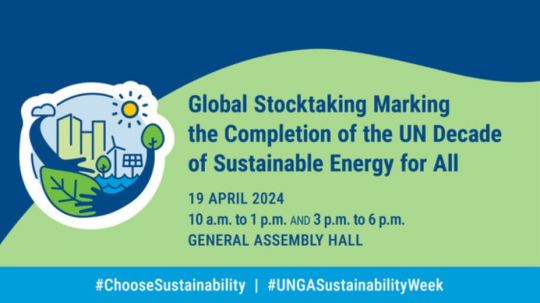
#high-level representatives#UN Economic and social council#ungasustainabilityweek#choosesustainability#UNGA78#decade of sustainable energy for all#SE4LL#ChooseSustainability#energy sector#energy security#energy services#ReliableEnergy#stakeholder partnerships#stakeholders#greenenergy#partnerships#sdg7#energy#innovative solutions#PowerGrid#electricity#investment#sustainable energy#affordable energy#clean energy#energy transition
0 notes
Text
Ancient redwoods recover from fire by sprouting 1000-year-old buds
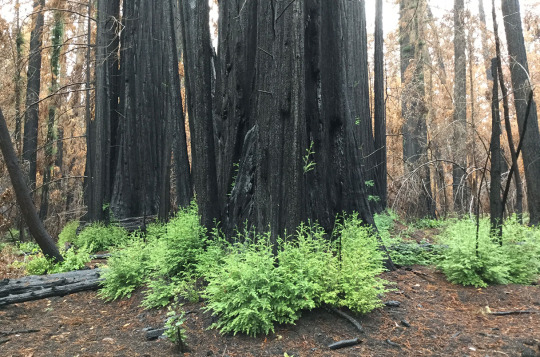
Article | Paywall free
When lightning ignited fires around California’s Big Basin Redwoods State Park north of Santa Cruz in August 2020, the blaze spread quickly. Redwoods naturally resist burning, but this time flames shot through the canopies of 100-meter-tall trees, incinerating the needles. “It was shocking,” says Drew Peltier, a tree ecophysiologist at Northern Arizona University. “It really seemed like most of the trees were going to die.”
Yet many of them lived. In a paper published yesterday in Nature Plants, Peltier and his colleagues help explain why: The charred survivors, despite being defoliated [aka losing all their needles], mobilized long-held energy reserves—sugars that had been made from sunlight decades earlier—and poured them into buds that had been lying dormant under the bark for centuries.
“This is one of those papers that challenges our previous knowledge on tree growth,” says Adrian Rocha, an ecosystem ecologist at the University of Notre Dame. “It is amazing to learn that carbon taken up decades ago can be used to sustain its growth into the future.” The findings suggest redwoods have the tools to cope with catastrophic fires driven by climate change, Rocha says. Still, it’s unclear whether the trees could withstand the regular infernos that might occur under a warmer climate regime.
Mild fires strike coastal redwood forests about every decade. The giant trees resist burning thanks to the bark, up to about 30 centimeters thick at the base, which contains tannic acids that retard flames. Their branches and needles are normally beyond the reach of flames that consume vegetation on the ground. But the fire in 2020 was so intense that even the uppermost branches of many trees burned and their ability to photosynthesize went up in smoke along with their pine needles.
Trees photosynthesize to create sugars and other carbohydrates, which provide the energy they need to grow and repair tissue. Trees do store some of this energy, which they can call on during a drought or after a fire. Still, scientists weren’t sure these reserves would prove enough for the burned trees of Big Basin.
Visiting the forest a few months after the fire, Peltier and his colleagues found fresh growth emerging from blackened trunks. They knew that shorter lived trees can store sugars for several years. Because redwoods can live for more than 2000 years, the researchers wondered whether the trees were drawing on much older energy reserves to grow the sprouts.
Average age is only part of the story. The mix of carbohydrates also contained some carbon that was much older. The way trees store their sugar is like refueling a car, Peltier says. Most of the gasoline was added recently, but the tank never runs completely dry and so a few molecules from the very first fill-up remain. Based on the age and mass of the trees and their normal rate of photosynthesis, Peltier calculated that the redwoods were calling on carbohydrates photosynthesized nearly 6 decades ago—several hundred kilograms’ worth—to help the sprouts grow. “They allow these trees to be really fire-resilient because they have this big pool of old reserves to draw on,” Peltier says.
It's not just the energy reserves that are old. The sprouts were emerging from buds that began forming centuries ago. Redwoods and other tree species create budlike tissue that remains under the bark. Scientists can trace the paths of these buds, like a worm burrowing outward. In samples taken from a large redwood that had fallen after the fire, Peltier and colleagues found that many of the buds, some of which had sprouted, extended back as much as 1000 years. “That was really surprising for me,” Peltier says. “As far as I know, these are the oldest ones that have been documented.”
... “The fact that the reserves used are so old indicates that they took a long time to build up,” says Susan Trumbore, a radiocarbon expert at the Max Planck Institute for Biogeochemistry. “Redwoods are majestic organisms. One cannot help rooting for those resprouts to keep them alive in decades to come.”
-via Science, December 1, 2023
#redwoods#california#wildfire#climate change#extreme heat#natural disasters#botany#plant biology#photosynthesis#santa cruz#hopepunk#sustainability#climate hope#united states#good news#hope
12K notes
·
View notes
Text
Why is hope prevalent & widespread among those at the frontlines of the struggle but often scarce among those at the peripheries who are shielded? I think it comes down to individualism and colonial values.
Resistance movements give me hope. Across history, in the face of brutal systemic violence, people have always fought for freedom and the right to love— each other, the land, their diverse cultures, & ancestors. Communities have dismantled entire empires. It took generations of unyielding resistance. It took a lot of faith, conviction and belief in a free future. It took decades & often centuries of work but people freed themselves. They always have. What can we learn from them?
Hope is not a feeling generated by an individual from within. Hope is a flame that is intentionally co-created in community that then permeates & passes through us all.
Hope, happiness, joy, contentment, safety, meaning, purpose, motivation, creativity, etc are all things an individual cannot independently generate in isolation even if colonial logic convinces you otherwise. Hope is a fire that is tended to and kept alive by the collective efforts of many. Just like any life-giving, life-sustaining energy that circulates within an ecosystem, we depend on each other to have hope. Like survival, hope is a collective responsibility, not an individual burden. We have to play our role in seeking out community where such hope can be co-created.
The struggle to forge community in itself is a journey with a million hopeful moments that can only exist alongside painful teaching moments. As long as we run from the struggle, hope will remain just as inaccessible.
another wonderful piece from Ayesha Khan!
188 notes
·
View notes
Text
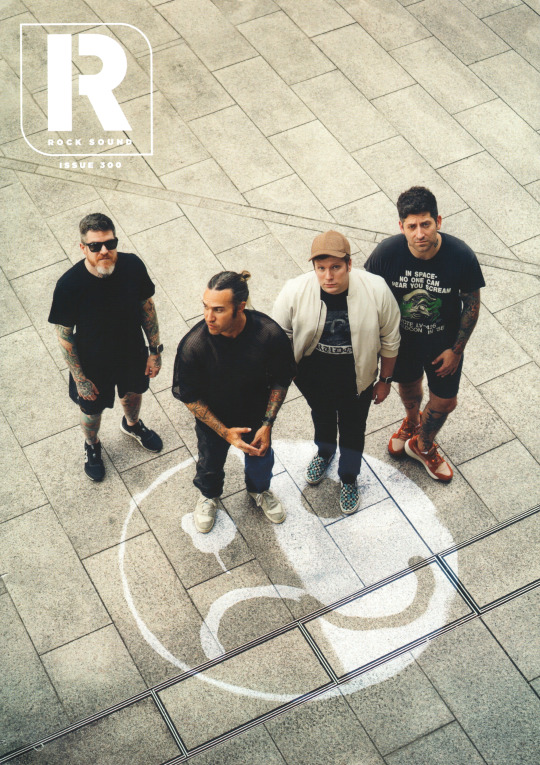


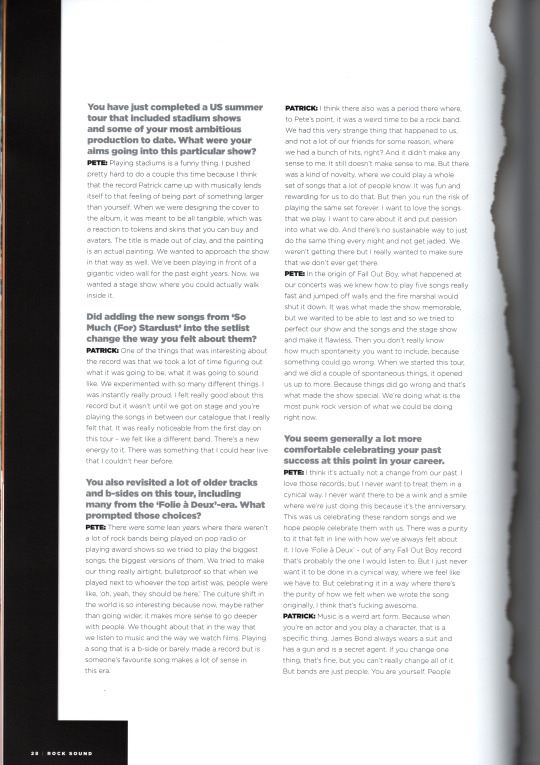



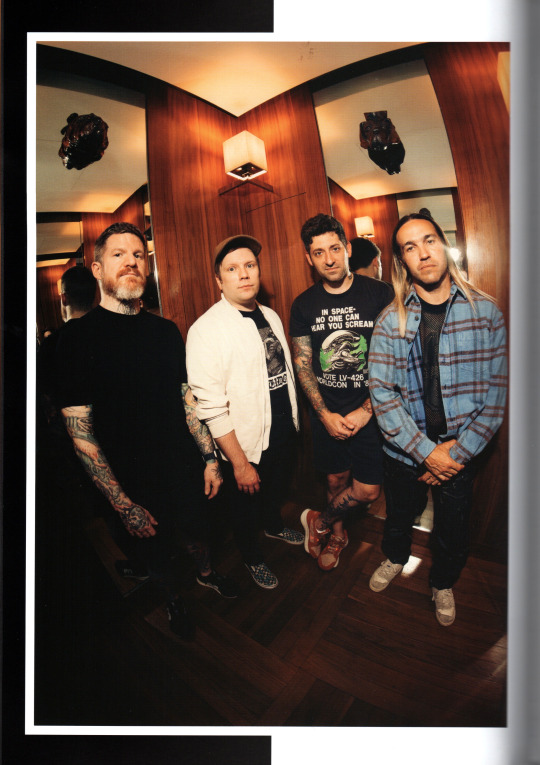
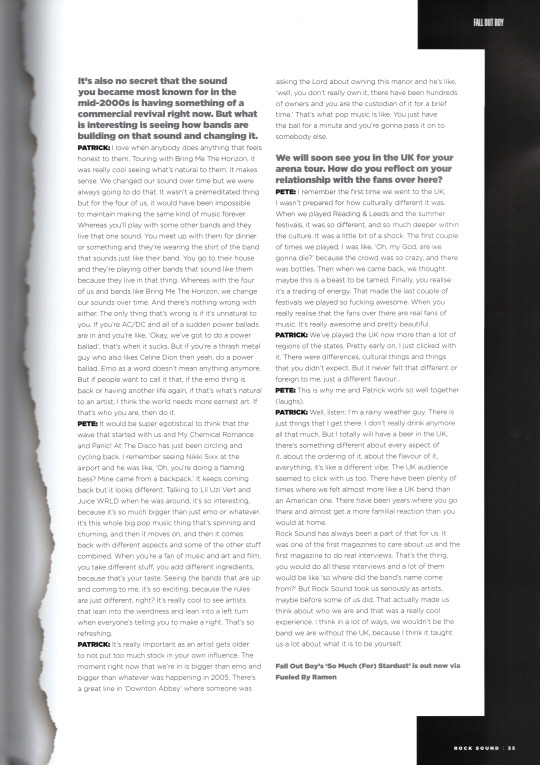
2023 september - rock sound #300 (fall out boy cover) scans
transcript below cut!
WHAT A TIME TO BE ALIVE
With the triumphant ‘So Much (For) Stardust’ capturing a whole new generation of fans, Fall Out Boy are riding high, celebrating their past while looking towards a bright future. Pete Wentz and Patrick Stump reflect on recent successes and the lessons learned from two decades of writing and performing together.
WORDS: James Wilson-Taylor
PHOTOS: Elliot Ingham
You have just completed a US summer tour that included stadium shows and some of your most ambitious production to date. What were your aims going into this particular show?
PETE: Playing stadiums is a funny thing. I pushed pretty hard to do a couple this time because I think that the record Patrick came up with musically lends itself to that feeling of being part of something larger than yourself. When we were designing the cover to the album, it was meant to be all tangible, which was a reaction to tokens and skins that you can buy and avatars. The title is made out of clay, and the painting is an actual painting. We wanted to approach the show in that way as well. We’ve been playing in front of a gigantic video wall for the past eight years. Now, we wanted a stage show where you could actually walk inside it.
Did adding the new songs from ‘So Much (For) Stardust’ into the setlist change the way you felt about them?
PATRICK: One of the things that was interesting about the record was that we took a lot of time figuring out what it was going to be, what it was going to sound like. We experimented with so many different things. I was instantly really proud. I felt really good about this record but it wasn’t until we got on stage and you’re playing the songs in between our catalogue that I really felt that. It was really noticeable from the first day on this tour - we felt like a different band. There’s a new energy to it. There was something that I could hear live that I couldn’t hear before.
You also revisited a lot of older tracks and b-sides on this tour, including many from the ‘Folie à Deux’-era. What prompted those choices?
PETE: There were some lean years where there weren’t a lot of rock bands being played on pop radio or playing award shows so we tried to play the biggest songs, the biggest versions of them. We tried to make our thing really airtight, bulletproof so that when we played next to whoever the top artist was, people were like, ‘oh yeah, they should be here.’ The culture shift in the world is so interesting because now, maybe rather than going wider, it makes more sense to go deeper with people. We thought about that in the way that we listen to music and the way we watch films. Playing a song that is a b-side or barely made a record but is someone’s favourite song makes a lot of sense in this era.
PATRICK: I think there also was a period there where, to Pete’s point, it was a weird time to be a rock band. We had this very strange thing that happened to us, and not a lot of our friends for some reason, where we had a bunch of hits, right? And it didn’t make any sense to me. It still doesn’t make sense to me. But there was a kind of novelty, where we could play a whole set of songs that a lot of people know. It was fun and rewarding for us to do that. But then you run the risk of playing the same set forever. I want to love the songs that we play. I want to care about it and put passion into what we do. And there’s no sustainable way to just do the same thing every night and not get jaded. We weren’t getting there but I really wanted to make sure that we don’t ever get there.
PETE: In the origin of Fall Out Boy, what happened at our concerts was we knew how to play five songs really fast and jumped off walls and the fire marshal would shut it down. It was what made the show memorable, but we wanted to be able to last and so we tried to perfect our show and the songs and the stage show and make it flawless. Then you don’t really know how much spontaneity you want to include, because something could go wrong. When we started this tour, and we did a couple of spontaneous things, it opened us up to more. Because things did go wrong and that’s what made the show special. We’re doing what is the most punk rock version of what we could be doing right now.
You seem generally a lot more comfortable celebrating your past success at this point in your career.
PETE: I think it’s actually not a change from our past. I love those records, but I never want to treat them in a cynical way. I never want there to be a wink and a smile where we’re just doing this because it’s the anniversary. This was us celebrating these random songs and we hope people celebrate them with us. There was a purity to it that felt in line with how we’ve always felt about it. I love ‘Folie à Deux’ - out of any Fall Out Boy record that’s probably the one I would listen to. But I just never want it to be done in a cynical way, where we feel like we have to. But celebrating it in a way where there’s the purity of how we felt when we wrote the song originally, I think that’s fucking awesome.
PATRICK: Music is a weird art form. Because when you’re an actor and you play a character, that is a specific thing. James Bond always wears a suit and has a gun and is a secret agent. If you change one thing, that’s fine, but you can’t really change all of it. But bands are just people. You are yourself. People get attached to it like it’s a story but it’s not. That was always something that I found difficult. For the story, it’s always good to say, ‘it’s the 20th anniversary, let’s go do the 20th anniversary tour’, that’s a good story thing. But it’s not always honest. We never stopped playing a lot of the songs from ‘Take This To Your Grave’, right? So why would I need to do a 20-year anniversary and perform all the songs back to back? The only reason would be because it would probably sell a lot of tickets and I don’t really ever want to be motivated by that, frankly.
One of the things that’s been amazing is that now as the band has been around for a while, we have different layers of audience. I love ‘Folie à Deux’, I do. I love that record. But I had a really personally negative experience of touring on it. So that’s what I think of when I think of that record initially. It had to be brought back to me for me to appreciate it, for me to go, ‘oh, this record is really great. I should be happy with this. I should want to play this.’ So that’s why we got into a lot of the b-sides because we realised that our perspectives on a lot of these songs were based in our feelings and experiences from when we were making them. But you can find new experiences if you play those songs. You can make new memories with them.
You alluded there to the 20th anniversary of ‘Take This To Your Grave’. Obviously you have changed and developed as a band hugely since then. But is there anything you can point to about making that debut record that has remained a part of your process since then?
PETE: We have a language, the band, and it’s definitely a language of cinema and film. That’s maintained through time. We had very disparate music tastes and influences but I think film was a place we really aligned. You could have a deep discussion because none of us were filmmakers. You could say which part was good and which part sucked and not hurt anybody’s feelings, because you weren’t going out to make a film the next day. Whereas with music, I think if we’d only had that to talk about, we would have turned out a different band.
PATRICK: ‘Take This To Your Grave’, even though it’s absolutely our first record, there’s an element of it that’s still a work in progress. It is still a band figuring itself out. Andy wasn’t even officially in the band for half of the recording, right? I wasn’t even officially the guitar player for half of the recording. We were still bumbling through it. There was something that popped up a couple times throughout that record where you got these little inklings of who the band really was. We really explored that on ‘From Under The Cork Tree’. So when we talk about what has remained the same… I didn’t want to be a singer, I didn’t know anything about singing, I wasn’t planning on that. I didn’t even plan to really be in this band for that long because Pete had a real band that really toured so I thought this was gonna be a side project. So there’s always been this element within the band where I don’t put too many expectations on things and then Pete has this really big ambition, creatively. There’s this great interplay between the two of us where I’m kind of oblivious, and I don’t know when I’m putting out a big idea and Pete has this amazing vision to find what goes where. There’s something really magical about that because I never could have done a band like this without it. We needed everybody, we needed all four of us. And I think that’s the thing that hasn’t changed - the four of us just being ourselves and trying to figure things out. Listening back to ‘Folie’ or ‘Infinity On High’ or ‘American Beauty’, I’m always amazed at how much better they are than I remember. I listened to ‘MANIA’ the other day, and I have a lot of misgivings about that record, a lot of things I’m frustrated about. But then I’m listening to it and I’m like ‘this is pretty good.’ There’s a lot of good things in there. I don’t know why, it’s kind of like you can’t see those things. It’s kind of amazing to have Pete be able to see those things. And likewise, sometimes Pete has no idea when he writes something brilliant, as a lyricist, and I have to go, ‘No, I’m gonna keep that one, I’m gonna use that.’
On ‘So Much (For) Stardust’, you teamed up with producer Neal Avron again for the first time since 2008. Given how much time has passed, did it take a minute to reestablish that connection or did you pick up where you left off?
PATRICK: It really didn’t feel like any time had passed between us and Neal. It was pretty seamless in terms of working with him. But then there was also the weird aspect where the last time we worked with him was kind of contentious. Interpersonally, the four of us were kind of fighting with each other… as much as we do anyway. We say that and then that myth gets built bigger than it was. We were always pretty cool with each other. It’s just that the least cool was making ‘Folie’. So then getting into it again for this record, it was like no time has passed as people but the four of us got on better so we had more to bring to Neal.
PETE: It’s a little bit like when you return to your parents’ house for a holiday break when you’re in college. It’s the same house but now I can drink with my parents. We’d grown up and the first times we worked with Neal, he had to do so much more boy scout leadership, ‘you guys are all gonna be okay, we’re gonna do this activity to earn this badge so you guys don’t fucking murder each other.’ This time, we probably got a different version of Neal that was even more creative, because he had to do less psychotherapy.
He went deep too. Sometimes when you’re in a session with somebody, and they’re like, ‘what are we singing about?’, I’ll just be like, ‘stuff’. He was not cool with ‘stuff’. I would get up and go into the bathroom outside the studio and look in the mirror, and think ‘what is it about? How deep are we gonna go?’ That’s a little but scarier to ask yourself. If last time Neal was like a boy scout leader, this time, it was more like a Sherpa. He was helping us get to the summit.
The title track of the album also finds you in a very reflective mood, even bringing back lyrics from ‘Love From The Other Side’. How would you describe the meaning behind that title and the song itself?
PETE: The record title has a couple of different meanings, I guess. The biggest one to me is that we basically all are former stars. That’s what we’re made of, those pieces of carbon. It still feels like the world’s gonna blow and it’s all moving too fast and the wrong things are moving too slow. That track in particular looks back at where you sometimes wish things had gone differently. But this is more from the perspective of when you’re watching a space movie, and they’re too far away and they can’t quite make it back. It doesn’t matter what they do and at some point, the astronaut accepts that. But they’re close enough that you can see the look on their face. I feel like there’s moments like that in the title track. I wish some things were different. But, as an adult going through this, you are too far away from the tether, and you’re just floating into space. It is sad and lonely but in some ways, it’s kind of freeing, because there’s other aspects of our world and my life that I love and that I want to keep shaping and changing.
PATRICK: I’ll open up Pete’s lyrics and I just start hearing things. It almost feels effortless in a lot of ways. I just read his lyrics and something starts happening in my head. The first line, ‘I’m in a winter mood, dreaming of spring now’, instantly the piano started to form to me. That was a song that I came close to not sending to the band. When I make demos, I’ll usually wait until I have five or six to send to everybody. I didn’t know if anyone was gonna like this. It’s too moody or it’s not very us. But it was pretty unanimous. Everyone liked that one. I knew this had to end the record. It took on a different life in the context of the whole album. Then on the bridge section, I knew it was going to be the lyrics from ‘Love From The Other Side’. It’s got to come back here. It’s the bookends, but I also love lyrically what it does, you know, ‘in another life, you were my babe’, going back to that kind of regret, which feels different in ‘Love From The Other Side’ than it does here. When the whole song came together, it was the statement of the record.
Aside from the album, you have released a few more recent tracks that have opened you up to a whole new audience, most notably the collaboration with Taylor Swift on ‘Electric Touch’.
PETE: Taylor is the only artist that I’ve met or interacted with in recent times who creates exactly the art of who she is, but does it on such a mass level. So that’s breathtaking to watch from the sidelines. The way fans traded friendship bracelets, I don’t know what the beginning of it was, but you felt that everywhere. We felt that, I saw that in the crowd on our tour. I don’t know Taylor well, but I think she’s doing exactly what she wants and creating exactly the art that she wants to create. And doing that, on such a level, is really awe-inspiring to watch. It makes you want to make the biggest, weirdest version of our thing and put that out there.
Then there was the cover of Billy Joel’s ‘We Didn’t Start The Fire’, which has had some big chart success for you. That must have taken you slightly by surprise.
PATRICK: It’s pretty unexpected. Pete and I were going back and forth about songs we should cover and that was an idea that I had. This is so silly but there was a song a bunch of years ago I had written called ‘Dark Horse’ and then there was a Katy Perry song called ‘Dark Horse’ and I was like, ‘damn it’, you know, I missed the boat on that one. So I thought if we don’t do this cover, somebody else is gonna do it. Let’s just get in the studio and just do it. We spent way more time on those lyrics than you would think because we really wanted to get a specific feel. It was really fun and kind of loose, we just came together in Neal’s house and recorded it in a day.
PETE: There’s irreverence to it. I thought the coolest thing was when Billy Joel got asked about it, and he was like, ‘I’m not updating it, that’s fine, go for it.’ I hope if somebody ever chose to update one of ours, we’d be like that. Let them do their thing, they’ll have that version. I thought that was so fucking cool.
It’s also no secret that the sound you became most known for in the mid-2000s is having something of a commercial revival right now. But what is interesting is seeing how bands are building on that sound and changing it.
PATRICK: I love when anybody does anything that feels honest to them. Touring with Bring Me The Horizon, it was really cool seeing what’s natural to them. It makes sense. We changed our sound over time but we were always going to do that. It wasn’t a premeditated thing but for the four of us, it would have been impossible to maintain making the same kind of music forever. Whereas you’ll play with some other bands and they live that one sound. You meet up with them for dinner or something and they’re wearing the shirt of the band that sounds just like their band. You go to their house and they’re playing other bands that sound like them because they live in that thing. Whereas with the four of us and bands like Bring Me The Horizon, we change our sounds over time. And there’s nothing wrong with either. The only thing that’s wrong is if it’s unnatural to you. If you’re AC/DC and all of a sudden power ballads are in and you’re like, ‘Okay, we’ve got to do a power ballad’, that’s when it sucks. But if you’re a thrash metal guy who likes Celine Dion then yeah, do a power ballad. Emo as a word doesn’t mean anything anymore. But if people want to call it that, if the emo thing is back or having another life again, if that’s what’s natural to an artist, I think the world needs more earnest art. If that’s who you are, then do it.
PETE: It would be super egotistical to think that the wave that started with us and My Chemical Romance and Panic! At The Disco has just been circling and cycling back. I remember seeing Nikki Sixx at the airport and he was like, ‘Oh, you’re doing a flaming bass? Mine came from a backpack.’ It keeps coming back but it looks different. Talking to Lil Uzi Vert and Juice WRLD when he was around, it’s so interesting, because it’s so much bigger than just emo or whatever. It’s this whole big pop music thing that’s spinning and churning, and then it moves on, and then it comes back with different aspects and some of the other stuff combined. When you’re a fan of music and art and film, you take different stuff, you add different ingredients, because that’s your taste. Seeing the bands that are up and coming to me, it’s so exciting, because the rules are just different, right? It’s really cool to see artists that lean into the weirdness and lean into a left turn when everyone’s telling you to make a right. That’s so refreshing.
PATRICK: It’s really important as an artist gets older to not put too much stock in your own influence. The moment right now that we’re in is bigger than emo and bigger than whatever was happening in 2005. There’s a great line in ‘Downton Abbey’ where someone was asking the Lord about owning this manor and he’s like, ‘well, you don’t really own it, there have been hundreds of owners and you are the custodian of it for a brief time.’ That’s what pop music is like. You just have the ball for a minute and you’re gonna pass it on to somebody else.
We will soon see you in the UK for your arena tour. How do you reflect on your relationship with the fans over here?
PETE: I remember the first time we went to the UK, I wasn’t prepared for how culturally different it was. When we played Reading & Leeds and the summer festivals, it was so different, and so much deeper within the culture. It was a little bit of a shock. The first couple of times we played, I was like, ‘Oh, my God, are we gonna die?’ because the crowd was so crazy, and there was bottles. Then when we came back, we thought maybe this is a beast to be tamed. Finally, you realise it’s a trading of energy. That made the last couple of festivals we played so fucking awesome. When you really realise that the fans over there are real fans of music. It’s really awesome and pretty beautiful.
PATRICK: We’ve played the UK now more than a lot of regions of the states. Pretty early on, I just clicked with it. There were differences, cultural things and things that you didn’t expect. But it never felt that different or foreign to me, just a different flavour…
PETE: This is why me and Patrick work so well together (laughs).
PATRICK: Well, listen; I’m a rainy weather guy. There is just things that I get there. I don’t really drink anymore all that much. But I totally will have a beer in the UK, there’s something different about every aspect of it, about the ordering of it, about the flavour of it, everything, it’s like a different vibe. The UK audience seemed to click with us too. There have been plenty of times where we felt almost more like a UK band than an American one. There have been years where you go there and almost get a more familial reaction than you would at home.
Rock Sound has always been a part of that for us. It was one of the first magazines to care about us and the first magazine to do real interviews. That’s the thing, you would do all these interviews and a lot of them would be like ‘so where did the band’s name come from?’ But Rock Sound took us seriously as artists, maybe before some of us did. That actually made us think about who we are and that was a really cool experience. I think in a lot of ways, we wouldn’t be the band we are without the UK, because I think it taught us a lot about what it is to be yourself.
Fall Out Boy’s ‘So Much (For) Stardust’ is out now via Fueled By Ramen.
#the cover is so funny. like theyre cute but that is genuinely bug angle. that is bugs under a rock angle. THEYRE ALREADY SHORT KINGS#fall out boy#pete wentz#patrick stump#andy hurley#joe trohman#time capsule#read the charts#ANYWAY GO HERE. GO READ HERE. BECAUSE I SPENT A LONG TIME TRANSCRIBING EVEN THO TRNASNCRIBING SUCKKSSS#i looped the spell soundtrack like 5 times and got jusmpscared by track9 every time. and then i put on smfs<3#patrick's comments about the mythologising of fob lore is so interesting#listen baby i know ur fed up and it's not ur fault but u have to understand. the story of ur band is on some genuine fanfic ass other level#the way they talk about neal avron is sooo funny#imagine being producer for this young band. and theyre brilliant but theyre also twentysomethings(derogatory)#also the way pete talks abt swift. lol. also why does he answer the q when patrick was the one in the studio lol???#ALSO also. pete being afraid of british ppl (valid and true)#and patrick pretty much taking to the uk like a duck to water (also valid and tru) is sooo funny#i rlly liked this interview i wiiiiish i got the bundle w the photobook and whatever but i was way too late :(((((((((
111 notes
·
View notes
Text
Renewable Energy
Ziratha, an intrepid young succubus researcher, finds the ultimate solution to the looking Succubus Energy Crisis: a device that brainwashes its subjects back into nourishing, delicious, easily-flustered virgins - even rough, experienced, punk trans girls like Vivi
This was a delightful commission from GrillFan65, one of my patrons, and features a very, very fun TF ;)
If you enjoy my work and are looking for more, or you want to support me, I strongly encourage you to check out my Patreon! I write erotica full-time, which means I need your patronage to keep creating, and my Patrons also get benefits like early access to my stories, extra stories, and the ability to vote on what I write next! So, if that sounds good to you, head over and join the couple hundred patrons I already have :)
---
“Wow. This is a succubus’s lab?” The crust punk trans girl looked around Ziratha’s research laboratory and sniffed. “I would have expected more candles. Magic circles. Maybe a few jars of goat semen or something.”
Ziratha the succubus rolled her eyes as the punk laughed at her own bad joke. “That’s a stereotype. You’d think humans would know better now. We’ve been living amongst your kind for decades now, and-“
“And succubi are simply people just like us, living perfectly normal lives, except for the whole needing sex for subsistence thing,” the punk interrupted. “Yeah, yeah. I’ve heard the history lesson before.”
Ziratha had to suppress a groan. Alongside her PhD research, a full-time job in its own right, she worked part-time as an adjunct making minimum wage. She’d forgotten what a good night’s sleep felt like. Half her blood was coffee. She was way too tired for this.
Unfortunately for her, this punk girl - Vivi - was the best shot she was going to get at seeing her research reach fruition.
“Anyway,” Vivi piped up, “hurry up and tell me why I’m here already.”
“You’re here,” Ziratha replied tersely, “because I caught you breaking a window at the back of the lab. Probably looking for something to sell. And because if you help me out, I can delete the feed from the security camera. Got it?”
“A girl’s gotta do what a girl’s gotta do,” Vivi shot back. “HRT ain’t free, you know?”
Ziratha sighed. In truth, she didn’t hold the attempted theft against her. It was simply that the succubus really, really needed just one single research subject. One was surely all it would take to get the funding board to sit up and pay attention.
“So, c’mon,” Vivi insisted. “What do you need me to do?”
Ziratha took a very, very deep breath. “OK, let me explain. Firstly, what do you know about the SEC?”
Vivi sniffed. “Sounds familiar.
“The Succubus Energy Crisis,” Ziratha told her patiently. “We succubi depend on energy harvested from our sexual partners. You clearly know that much. However, what you may not know is that sexual energy isn’t a sustainable resource.”
“How’s that?” Vivi seemed more interested in scoping out Ziratha’s messy lab than in the answer.
“The amount of energy a succubus harvests from her partner is inversely proportional to their sexual experience,” Ziratha went on. Reciting this was practically automatic. She’d been over it a hundred times in class. “The potency of sexual energy declines after, well, sex. Especially sex with succubi. The more we take, the less they have to give. Sex with ‘well-used’ partners yields negligible energy - and furthermore, might actually kill the human.”
“OK.” Vivi laughed offhandedly. “So what? There will always be more virgins, right?”
“That’s what people used to say about coal and oil,” Ziratha pointed out. “As it turns out, no. Thanks to a declining birth rate, an increasingly sexualized culture, and a constant expansion of liberal sexual mores into untapped parts of the world, reserves are depleting faster than they can naturally refill. Humanity’s store of sexual energy is trending towards zero. Starvation for succubuskind.”
“Right…” Vivi said skeptically, before shrugging. “I don’t see what that’s got to do with me.”
“I was getting to that,” Ziratha retorted. “I’m working on a solution, OK? See, traditional succubic magiscience holds that the depletion of sexual energy following virginity loss is a spiritual-metaphysical phenomenon. In other words, completely and totally irreversible. But that’s bullshit!”
Vivi looked up sharply at the sudden outburst of passion from the succubus.
“Those idiots in the academy just don’t want to let go of their precious little doctrines!” Ziratha fumed. “They’d rather sink billions into pipe dreams than admit the textbooks could be wrong. I mean, the SuperCharm Collider? Seriously? It’s a joke! But once I get my funding, I’ll be the one who’s laughing!”
She let out a loud, rich cackle worthy of her demonic forebears.
“See, my research indicates that the source of this problem is purely neural-psychological,” Ziratha ranted. “In other words: if you can turn back the clock on someone’s mind, you can completely refill their sexual energy. It’s a perfect solution. Renewable energy for all, forever. But the Institutional Review Board won’t give me the damn funding for a proper set of clinical trials.”
“Hold up,” Vivi broke in. “Are you about to tell me that I’m your guinea pig? And… you want to turn me back into a virgin?”
Ziratha grinned, her eyes flashing behind her nerdy glasses. “Exactly! Behold my Transcranial Magical Stimulation Unit. Which I expect to be known more widely as: the revirginization helmet!”
Reaching over to her workbench, she picked up something that looked halfway between an old VR headset and a military-issue tin foil hat.
Vivi folded her arms over her battle vest. “There’s no way I’m wearing that.”
“It’s safe!” Ziratha insisted defensively. “I made sure of it. If it wasn’t, this would kill my entire career.”
“That’s easy for you to say,” Vivi replied, unconvinced. Then, she tilted her head to one side, and a crafty, dirty grin slowly spread across her face. “Hey. How about you and I go someplace comfortable and find a solution to a different kind of energy crisis?”
“Huh?” Ziratha blinked.
Vivi kept grinning and winked.
“Oh, I see.” Ziratha smiled wearily. “You want to have sex.”
Vivi giggled and nodded. “Don’t take this the wrong way,” the punk girl said, “but you look like you could do with a little top-off.”
Ziratha frowned. “Rude!”
In truth, though, she couldn’t be too offended. It had been a long time since Ziratha had fed properly, and it showed. Proper, nourishing partners weren’t easy to come by. Her deep red skin had taken on a slightly unhealthy pallor, her horns were nubs, and her tail was just a thin, dainty little thing. It was a far cry from the kind of overbearingly transhuman appearance succubi could have if they were permitted to glut themselves to their hearts’ content.
Admittedly, Ziratha wasn’t exactly playing to her own strengths. Instead of anything particularly alluring, she was dressed in the universal uniform of the overworked grad student: an old t-shirt, grey sweatpants and comfy sneakers, with a lab coat over top. Her hair was tied back in a hasty ponytail, her huge, round glasses made her look like exactly the nerd she was, and she hadn’t bothered with any makeup to hide the dark circles under her eyes.
Beneath it all, though, she still had a killer body. She was still a succubus, after all.
“What do you say?” Vivi proposed. She glanced pointedly at Ziratha’s chest. “Wanna turn those C-cups into something bigger?”
Ziratha was surprised Vivi knew so much about how energy levels affected succubi. “You’ve slept with my kind before?”
“Sure have.” Vivi’s smirk was infuriatingly cocky. “A few times. And don’t worry - they were never disappointed. I know just how to treat a girl - mortal or demon.”
Ziratha rolled her eyes at the lewd comments, but she was smiling too. This made Vivi the ideal test subject. It was what Ziratha had been hoping for when she’d first laid eyes on her. Vivi was tall, hot, and confident, and while Ziratha knew better than to judge a book by its cover, Vivi did look like someone with a certain amount of ‘experience’.
She was pure punk, top to bottom. Vivi was wearing a battle vest covered in patches and spikes over a simple, loose-fitting top, and beneath the belt she had on a pleated skirt, some torn stockings, and an impressive pair of boots. A lot of the skin she was showing was covered in ink, and both sides of her head were shaven, leaving her with a messy streak of hair that was dyed neon blue.
Ziratha would have been pretty shocked if Vivi had told her she was a virgin.
“As attractive an offer as that is, I’ll have to decline.” Ziratha didn’t bother to conceal her weary sarcasm. “You’re a guinea pig.”
Vivi rolled her eyes. “Fine. I guess I can think of worse things than getting my ‘sexual energy’ replenished - whatever that’s gonna feel like.”
“Great. Great!” Ziratha immediately started ushering Vivi deeper into her lab before the punk could change her mind. “Take a seat, please.”
She gestured towards a chair that looked like it had been ripped out of a hospital examination room, with all kinds of wires and machines hooked up to it. Vivi glanced at the chair dubiously, but still moved to sit down.
“What’s all this, huh?” she asked, settling.
“Just monitoring equipment,” Ziratha explained. “Taking your vitals, measuring neural readings. That kind of stuff.”
“Nerd stuff, got it.” Vivi winked. “OK. I’m ready, I guess.”
Ziratha could barely contain her excitement. This was it. Her breakthrough. Her triumph. But the succubus was too much of a scientist to count her chickens before they hatched. “Here. Put this on.”
She handed Vivi the helmet she’d spent hundreds of hours designing and building. The punk looked at the strange, ramshackle device even more dubiously than she had at the chair, but she did as she was told. Once the helmet was properly adjusted, the screen mounted to it hung in front of Vivi’s face, obscuring most of her vision.
Ziratha tapped a few keys on her laptop and the screen came to life. A few lights and indicators on the helmet started to glow and flash, and the whole apparatus began to hum as the large capacitors mounted to it started to charge.
“Hey, so, how long is this going to take, anyway?” Vivi asked. The punk sounded a little less brash and a little more uncertain now. “Is this, like, some kind of long-ass meditation thing? Because I have places to be.”
“No, don’t worry,” Ziratha answered. “It’s much quicker than that.”
The succubus tapped a few more keys, checked a few readouts, and then hammered the space bar.
There was a huge, bright flash, like an old camera going off.
Vivi went still and stiff for a moment, and then groaned faintly.
“What the fuck?” she complained. “What… was that it?”
“That was it,” Ziratha confirmed. Her tail was very straight, and her voice was thick with anticipation. “How do you feel?”
“My head is throbbing.” Vivi slipped the helmet off her head and blinked as her eyes readjusted. “You could have given me some real warning, you know. So, did it work?”
Ziratha glanced at her laptop screen. “According to the diagnostics, it should have worked.”
“How’s my, uh, energy?” Vivi asked, a faintly mocking smile on her face. “Any of your fancy instruments tell you that?”
Ziratha simply returned the smile. “Oh, I don’t need any instruments for that at all.”
The succubus reached out and took Vivi’s hand, and let her demonic sixth sense for energy tell her everything she needed to know. Her smile immediately became a wide grin. Oh yes, it had worked. Succubi could always tell when someone would make a good meal. It was no different from any other predator’s sense of smell, although physical contact made it far more precise. Right now, Vivi had the scent of a ripe, untouched virgin.
This was it. The breakthrough Ziratha had long searched for. Her invention was about to change the world.
Despite such heady thoughts, though, Ziratha wasn’t celebrating. Something else had caught her attention. There was something very strange about the way Vivi was reacting.
The punk girl was trying not to let it show, but she kept squirming and shifting in her seat. A distinct pink blush was showing in her cheeks, and Ziratha could feel Vivi’s palm starting to turn hot and sweaty as they held hands.
The succubus tilted her head. Now this was very, very interesting.
“Vivi,” Ziratha said. “How do you feel now?”
Vivi couldn’t seem to meet her gaze. “I-I’m fine,” she blurted out in reply. “It’s nothing.”
Ziratha wasn’t buying that for an instant. She had a succubus’s instincts. She could tell when someone was seriously flustered. Experimentally, Ziratha lent in closer and squeezed Vivi’s hand.
“Are you sure?”
“Yes! Jeez!” Vivi’s voice was a little too strained. Under Ziratha’s watchful gaze, she twitched tellingly. “You’re just being kind of l-lewd.”
Lewd? Just by holding her hand? “Fascinating…” Ziratha murmured.
The succubus pulled away, allowing Vivi to breathe a sigh of relief, and inspected some of her equipment readouts more carefully.
“It clearly worked,” she said, as much to herself as to her test subject. “But there’s signs of something else, too… hey, Vivi. Remind me: you’ve had sex, right?”
In contrast to her earlier, cocksure attitude, Vivi now looked like a deer in headlights at the question. “W-w-well, yeah! Of c-course!”
“So your memory hasn’t been affected, just…” Ziratha murmured, before turning back to Vivi and clapping her hands. “I think I know what’s happened!”
“What?” Vivi demanded. “I mean, uh, nothing. Obviously. But what?”
“Just as I was hoping, my revirginizer helmet completely returned you to a virgin state regarding your reserve of sexual energy,” Ziratha explained. “But I theorize that it also affected some of your closely-related inhibitions, skills, and arousal responses.”
Vivi blinked. “And what does that mean? English please.”
“Well, do you remember being a blushing, nervous, inexperienced teenager, years ago? Remember how much ‘steam’ you had to blow off on a daily basis? Remember how it made you feel when a girl so much as looked at you?”
Vivi nodded, and waited for Ziratha to say something else. But when Ziratha just glanced at her significantly, the punk girl turned as white as a sheet.
“N-no way,” Vivi protested. “You can’t be serious.”
“I’m afraid so.” Ziratha giggled. “It’s all connected, it seems. Congratulations. In just about every way that counts, you’re a virgin again.”
Vivi turned from white back to red upon hearing the v-word said out loud. She made to stand up. “I-I can’t believe you did this to me. I gotta get out of here.”
“Wait, wait,” Ziratha urged. She moved to Vivi’s side and calmed her with a simple hand on her arm. “I should really run a few more tests. Just to make sure.”
The succubus’s nostrils flared. She was shocked at how potent Vivi’s energy now felt. It was palpable, even when they weren’t touching. She could sense it in the air. Clearly, she had to investigate further. All in the name of science, of course.
Vivi was back to looking flustered, but she still threw a mutinous glare at Ziratha. “Y-you’re crazy! I can’t believe I even…”
Ziratha swiftly decided that if the betterment of succubuskind wasn’t a good enough reason for Vivi, she’d have to resort to other forms of persuasion. She bent down at the waist, putting her face close to the punk’s, and made her eyes very big and alluring.
“Please?” she whispered, in a voice that was suddenly soft and intimate. “Won’t you stay with me?”
Vivi looked like her body temperature had just shot up ten degrees, and Ziratha noticed that she couldn’t seem to meet her gaze properly. The succubus was sure she wouldn’t have fallen for that five minutes ago, but now she was a total sucker. “S-s-sure,” Vivi managed, in a strained voice.
“Wonderful.” Ziratha licked her lips. The distinctive virgin-scent Vivi was starting to give off was just delicious. “These readings - and reactions - are extraordinary. And I’ve done nothing more than hold your hand.”
Vivi whimpered plaintively.
“I can’t help but wonder,” the succubus murmured, “what kind of yields you might produce with slightly more purposeful stimulation.”
Vivi’s eyes registered alarm but, before she could protest, Ziratha slipped closer and planted a kiss on the punk girl’s cheek.
Her reaction was as immediate as it was striking. Vivi let out a faint gasp and her back arched slightly, even though she was clearly trying as hard as possible not to show it. But even more striking was the intensified deer-in-headlights look in her eyes, like she was desperately struggling to figure out what this meant and what she should do about it, even as she was so devastatingly flustered she couldn’t even manage basic addition.
Ziratha’s nostrils flared again. This was amazing, and she was starting to become aware of just how long it had been since she’d had a real feeding.
“Wow,” she said teasingly, momentarily letting her instincts get the better of her. “Just from one little kiss, huh?”
Vivi whined indignantly. "I-it’s not… that’s… t-this is nothing!”
“Yeah?” Ziratha couldn’t resist a giggle. “It’s just so funny - you seemed so cocky before. So experienced.”
“I am experienced!” Vivi tried to insist. “I’ve f… um… fu… I mean, you know… I’ve had s-s-s-“
Ziratha’s grin just kept growing as she watched the previously fierce punk trail off, her blush growing steadily deeper as she struggled to bring herself to actually say it. The transformation was quite the sight to behold. She had to keep pushing Vivi further. She just had to. It was part of the experiment, somehow, she reasoned. The succubus took advantage of Vivi’s helpless spluttering to press closer still and put her lips right by her ear.
“Sex?” Ziratha breathed, pouring as much suggestion and seductive glee as she possibly could into that one, single word.
Vivi looked like she was about to explode.
“You see?” Ziratha drew back, smirking victoriously. “You’re not experienced. Not really. Not anymore. You can remember that you’ve had sex before - but that’s it. And you can barely even bring yourself to think about those memories, because you might get too worked up. Neither your mind nor your body knows how to handle it.” She giggled. “Typical virgin.”
“I-I’m not…!” For a moment she thought Vivi was about to start tearing up, but then the punk girl managed to rally herself. “Y-you’re just messing with me! That’s all! It’s your stupid little machine, making me all confused. T-that’s the only reason I can’t think straight right now. I’m not, um, w-worked up.”
“Yeah?” Ziratha challenged. “Then explain this for me, please.”
She reached down and rested her hand firmly on the big, unmistakable tent in Vivi’s skirt.
Immediately, Vivi went as white as a sheet. Clearly, until that moment, she hadn’t noticed the huge hard-on she was sporting. She attempted a protest, or perhaps an explanation, but all that came out was a few strangled, incoherent sounds.
“My, my.” Ziratha licked her lips again, without even realizing it. She was so very hungry. “You see? You’ve become so adorably excitable.”
Vivi whined as Ziratha started stroking her fingertips along the surface of her bulge. “Y-you can’t just… what the hell are you d-doing? This is harassment!”
“I’m a scientist, Vivi,” Ziratha chided, in a voice that made her sound anything but scientific. “After my experiment, it’s only natural for me to give you a nice, thorough examination.”
The punk girl let out another whimpered protest, seeming to sense Ziratha’s ulterior motive, but under the succubus’s ministrations that soon gave way to a weak, pitiful moan. The new virgin was like putty in Ziratha’s hands. The power, the energy, the scent - it was all intoxicating.
“In particular,” Ziratha decided, “I think it’s only proper that I get a reading on your, ah, endurance. I really think - I really do think - it could be very, very scientifically interesting.”
Science was increasingly slipping out of view. Ziratha’s gaze was set firmly on the huge tent in Vivi’s skirt, and it was getting harder and harder to think clearly. After a little teasing, that sweet, sweet virgin energy was coming off Vivi in waves. The laboratory was thick with its scent.
Vivi was still giving the succubus that achingly alluring deer-in-headlights look, but after a moment, her willpower started to wane. She nodded. Ziratha’s nostrils flared. That made sense too. What kind of virgin had the resolve to say ‘no’ to a succubus?
In exchange, Ziratha decided, maybe it was time to make good use of some of the inherent succubic talents she’d spent all of grad school neglecting.
Ziratha straightened up and, as Vivi watched, shrugged out of her heavy lab coat. As it fell to the ground, she reached up and removed her hair tie, shaking her head to make sure her hair cascaded down around her face. Vivi was all but hypnotized by the sight.
But that was only the beginning.
Next, Ziratha took her t-shirt by its hem and lifted it off over her head. She moved slowly, though, letting the helpless punk watching her savor the sight of her tummy and cleavage being revealed. The way she slipped out of her sweatpants was even more seductive. She made a dance of it, swinging her hips from side to side as she peeled them away from her body to expose her long, sculpted legs.
The striptease left Vivi with a little trail of drool escaping one corner of her mouth. She couldn’t seem to stop leering. Her eyes were shining like she couldn’t believe her luck, and the tent in her skirt was now marked with a growing spot of damp precum.
Underneath her clothes, Ziratha wasn’t wearing lingerie, merely a comfy sports bra and a matching pair of boxers. But that, she decided, was plenty to work with when it came to a virgin.
And from the look on Vivi’s face, she was right.
“Tell me,” Ziratha panted, “have you ever gotten a lap dance before?”
Vivi looked almost panicked as she shook her head.
“Great,” Ziratha purred. “Then I suppose this will be a genuine first.”
Effortlessly, the succubus eased her weight into the examination chair, and backed up inch by inch until her naturally huge, curvy ass was pressed right up against Vivi’s hard bulge.
Vivi squeaked like a mouse.
At this point, her every little noise and twitch was like a red rag to a bull. The newly-restored virgin’s scent was so thick in the air Ziratha could taste it. Her hunger was awakening instincts she’d never known she had. Moving to the sound of unheard music, she started grinding and gyrating like she’d been doing it all her life.
The effect the lap dance had on Vivi was nothing short of explosive.
The punk looked like every bit the virgin she now was. Her eyes were wide and practically bulging, and her mouth was contorted into a goofy, uneven shape halfway between an amazed grin and a look of desperate, anxious disbelief.
She looked like she was about to blow.
“C’mon,” Ziratha mocked, in a voice dripping with honey and brimstone. “You can do better than this, right, virgin?”
Her teasing elicited another strangled whimper that just made the succubus want to push Vivi further and further. She danced her way up the punk girl’s body and turned to face her, rolling her hips as she pushed her ass back out behind her to grind into her throbbing bulge.
“Be a good girl,” she teased. “Hold on a little longer for me.”
Vivi just nodded haplessly. Her eyes were scrunched up closed, and she was gripping the sides of the chair so tightly her knuckles had turned white. Ziratha could just imagine what was going on in her head. Baseball scores. Times tables. Whatever she needed to help not utterly humiliate herself.
“Let’s see if you can handle something a little more… direct.”
Ziratha arched her and straightened her tail, daring the virgin punk writhing beneath her to open her eyes and stare at her amazing tits. Then, she reached back and used her deft fingertips to unfasten Vivi’s skirt. Vivi let out a moan that was as much protest as eagerness, but it didn’t stop Ziratha from using the motion of her hips and thighs to slide the garment out of the way, and then pull aside her panties until her hard, leaking cock was completely exposed.
Zirath’s long, forked tongue lolled out of her mouth as she stared at it, dripping drool down onto Vivi.
She needed it.
“Good news, punk,” she breathed, shivering. “You’re about to get your cherry popped.”
“W-w-what?” Vivi exclaimed pitifully.
“It’s, uh, for the experiment,” Ziratha reasoned. She was frenzied as she tore off her bra and panties. “I need to sample, uh… and, well, get a reading on the volume of…” She rolled her eyes and licked her lips. “Actually, forget the science. I’m just hungry, and you’re ripe for the eating.”
“B-b-but!” the trans girl spluttered, as Ziratha positioned herself against her cock. “I-I don’t know if I’m ready yet!”
“Yeah?” Ziratha paused, bemused.
"I mean… uh…” A bashful look came over Vivi’s face. “It’s just… I maybe… I wanted it to be special. You know?”
“Oh my god.” Ziratha snorted a laugh, and grinned wickedly. “You are going to be just delicious.”
In a single motion, she dropped her hips and impaled herself on Vivi’s cock.
Immediately, Vivi’s voice shot up an octave, and she let out a girlish cry of absolute pleasure. Right after, Ziratha’s rich, gleeful moans joined the chorus. The succubus couldn’t believe how good the virgin’s cock felt. It wasn’t just the sensation. It was the sustenance. Merely being in Vivi’s presence for the last few minutes had made Ziratha fiercely hungry. Now, at last, that hunger was being sated.
Once she recovered from the initial hit, Ziratha started moving her hips and bouncing greedily on the end of Vivi’s shaft. With each bounce, the punk girl underneath her thrashed madly in a clumsy, instinctive attempt to meet Ziratha thrust for thrust.
She mostly failed. But the attempt, at least, was adorable.
As she rode the sensitive, inexperienced punk, Ziratha started howling with glee. She’d never had the pleasure before, but it was true what they said - there was nothing like milking a virgin. Her body was humming with energy, and every time she buried Vivi’s cock to the hilt inside her pussy, the sensation got sweeter and sweeter. Something about the flavor of a virgin’s energy was utterly transcendent, and it was made all more nourishing by what it represented.
Ziratha’s complete and total victory.
Unsurprisingly, it wasn’t long before Vivi’s moans started to peak, signaling that she was at the edge. Clearly, despite her memories, the virgin had absolutely no stamina. Ziratha wasn’t going to complain. The orgasm was the sweetest part of the meal.
“Go ahead!” Ziratha urged. “Blow your load already. We both know you can’t hold back anymore.”
With a cry of absolute, mortified bliss, Vivi exploded inside her.
Ziratha’s moans peaked too when she felt Vivi’s virile, nourishing cum paint her insides. It was better than anything she’d ever felt before. The power, the pleasure, the feeding - all of it. Ziratha could already feel her body priming itself to swell and change with the infusion of fresh energy.
The ecstatic rush of it made her greedy. She wanted more. She wanted it all. Ziratha squeezed down on Vivi and started riding her harder and faster than ever. Every bounce, every thrust, coaxed more and more sweet, sweet cum from the virgin’s cock, until Vivi was whining in blissful agony as she came down from the high of orgasm. Eventually, Vivi’s eyes rolled back into her head and simply passed out, her mind overwhelmed past its limits by sheer pleasure.
Ziratha kept riding her all the same. The succubus didn’t stop until she’d milked her for every last drop.
Eventually, though, once her hunger was sated, she slumped down next to the punk girl, giggling intermittently in giddy, light-headed glee. The succubus’s head was already filling with daydreams of fame and wealth when Vivi came to and pulled her into a hesitant, needy embrace.
“Hey, u-um,” Vivi whispered earnestly, in a voice that was anything but punk. “W-was it good for you too?”
“Huh?” Ziratha roused herself. There was something strange about the way Vivi sounded. No; about the way she felt. Ziratha had expected her to start returning to something closer to her normal behavior.
“I-I-I just, uh…” Vivi was once again turning bright red. “I-I thought it was really special. You know? Like, um, maybe we really have a connection.”
Ziratha seized Vivi’s hand again and, as Vivi stared at her hopefully, paid close attention to what she could sense from the punk girl. When the penny dropped, she started cackling.
“Oh my god!” she howled. “I can’t believe it. You’re still the same way. As fresh as ever.”
“What do you mean?” Vivi sounded defensive.
“I’m definitely going to need to hold you for some… oversight observation. Just to make sure.” Ziratha licked her lips suggestively. “But I can already tell. It’s like your brain can’t adapt anymore. Not just your energy levels. Your social skills. Your inhibitions. Your stamina. Everything.”
“What?” Vivi pressed anxiously.
“It’s the revirginization,” Ziratha pronounced. “All of it. It’s permanent.”
***
Mere weeks later, it was a very different Ziratha that stood upon the stage to make her big pitch to a room packed full of succubus leaders and investors. It wasn’t just the confidence - although she had that in spades, now that her Nobel prize was apparently all but assured. Her body had changed too. She stood taller. Grander. She exuded power and presence, and all of her body’s assets had gone from merely ‘hot’ to inhumanly mouth-watering. Her horns were a massive, knotted crown upon her head, and her tail was as deft as a whip and as thick as an anaconda.
All thanks to her favorite little meal.
Vivi was standing a little way behind her on the stage, and while physically she was unchanged, she seemed to have shrunk just as Ziratha had grown. She exuded a fragile, nebbish submissiveness despite all tattoos and piercings. She wore a choker collar bearing Ziratha’s name around her neck, and she was wearing a dress.
Ziratha liked her that way. And Vivi was no longer able to argue with the succubus.
“So, as you can see from our data, our early clinical trials have borne out the most promising of my invention’s results,” Ziratha was saying, as she rounded off her speech. “The regression to maiden status is, both psychologically and metaphysically speaking, permanent. The process isn’t damaging, but the subject’s mind naturally sheds its ability to develop new sexual skills or comfort zones, physical or social. Accordingly, their energy levels remain at peak capacity and potency - forever.”
Ziratha paused for a beat, letting the crowd of succubi sitting in front of her drink that in.
“In short,” she concluded, “they’re helpless perma-virgins. Isn’t that right, Vivi?”
Vivi blushed an incredibly deep red and looked down at the floor, but nodded.
“So!” Ziratha clapped her hands. “It’s safe to say that we’re ready to move into pre-production. Soon enough, each and every one of you could have one of my devices in your very own hands - assuming you’re willing to provide me with funding, of course. What do you say, ladies? A future of infinite, renewable energy awaits us!”
As expected, the auditorium was immediately filled with thunderous applause.
The age of the Succubus Energy Crisis was over.
The age of perma-virgin mortals and succubus dominance was about to begin.
---
I would like to express my gratitude for the generosity of all those who support me on Patreon, and to give a special thanks to the following patrons in particular for their exceptional support:
Artemis, Chloe, J, Secret Subject, Kathryn, Lucy, Dex, orangesya, Red, dmtph, Ember, MegatronTarantulas, Vanessa, Matt, Jeremy, Mattilda, Emily, William, ntad, Flluffie, Silgon, The Flock, ourladyoflilacs, Luna, Abigail, steb, Hypnogirl_Stephanie_, nicholas, Sue, Alan_, mintyasleep, Noelle, Lavender, Madness, Michael, Tasteful Ardour, Michael, Matthew, Full Blown Marxism, Anonymous, GrillFan65, Huge_Nerd, ZephanyZephZeph, Tram345, 8947jts, Chris, Breadloaf, Kyle, Emma, Jack the Monkey, Paul, Willow, Shadows exile, Drone 8315, Matthew, Alex, Madness, Sam, Selina, Daniel, Bubble_Butt, Francesca, WhyamIhere, John, Sarah, Crittergang, Setcab, Erin, Elysium, Bacon Man, Flintnsteal, Arik, John, bluaph, Kyle, Morriel, Jack the Monkey, Sola, NewtypeWoman, Envy, hellenberg, shoktherapy, L, Jim, Black Star, Kay, Michael, John, Praxis Memetics LLC, Frank, William, Olives, Christopher, Charlotte, Faun, Riley, Brinn, Brendon, B, Jackson, Kyle, Dennis, Nandi, Sanya, David, Morder, Myles_EXVS, Jade, Skylar, Foridin, gabbermoth, Jennifer, Selina, Violet, Slifer274, paxDulcetGirl, Roxxie, Hal, Devi, Phoenix, Laurel, Ivy, Jim, Michael, Joseph, June, Yaoups, Yooby Bomb, Peter, Paige, Sophie, imaencuru, Thomas, Katherine, Liz, uusavutonauto, Jens, Ada, EepyTimeTea, nitin, hypnoenby, Sebastian, ds2coffin, Yaoups, SuperJellyFrogEx, Utumnon, Bacon Man
148 notes
·
View notes
Text
Transcription of Fall Out Boy's interview with Rock Sound

Since I was going to read the article anyways, I thought I'd transcribe in case it'll be more accessible to read for others. The interview with Pete and Patrick goes in depth on the topics of tourdust, evolving as a band, So Much (For) Stardust, working with Neal Avron, and more.
Thank you to @nomaptomyowntreasure who kindly shared the photos of the article! Their post is linked here.
PDF link here. (more readable format & font size)
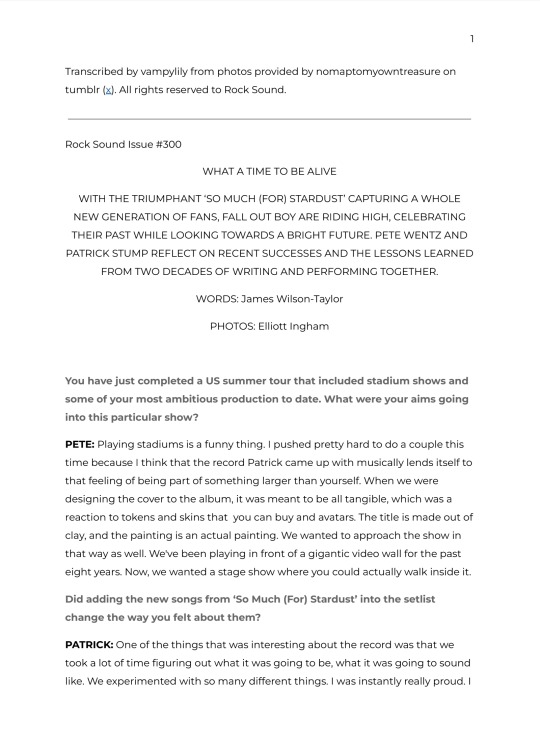
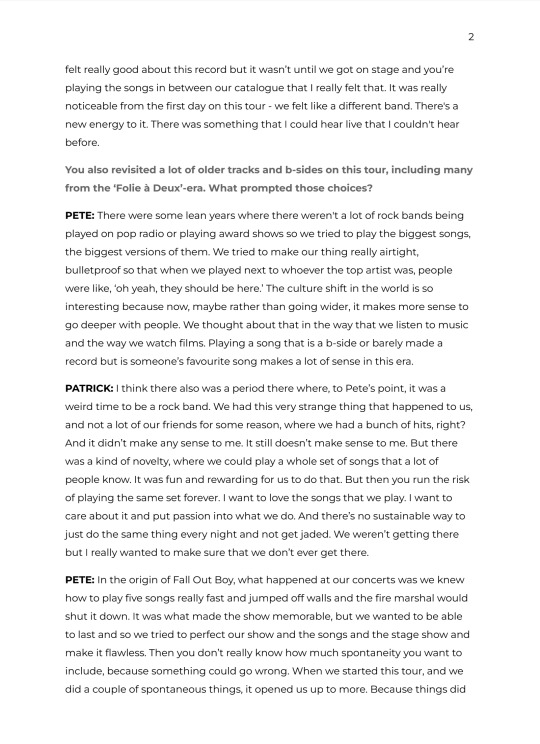
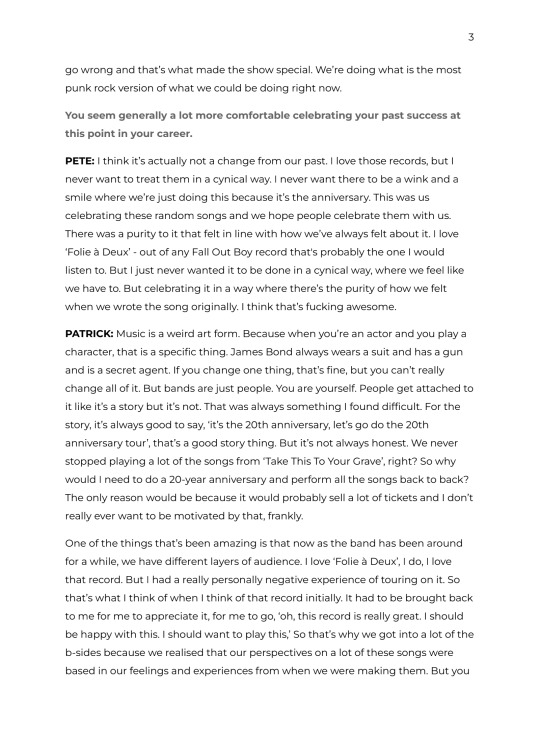
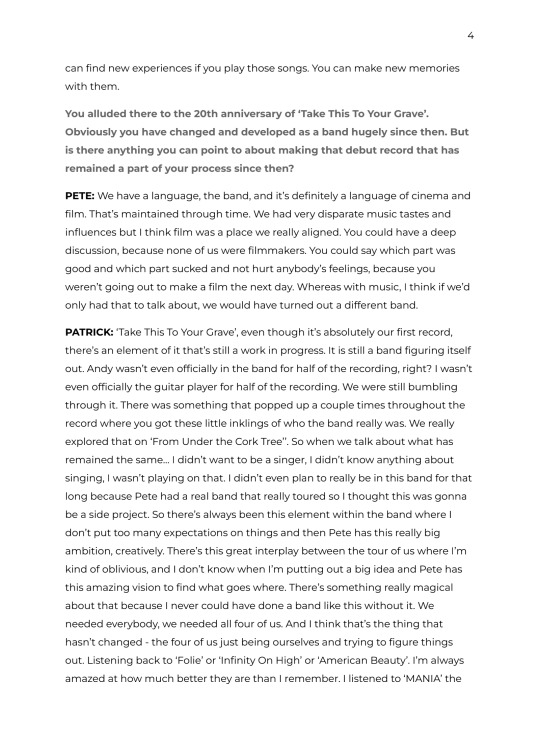
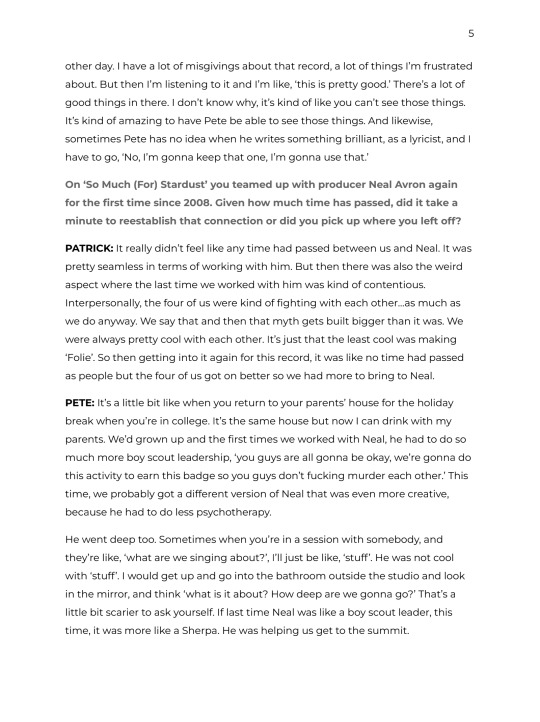
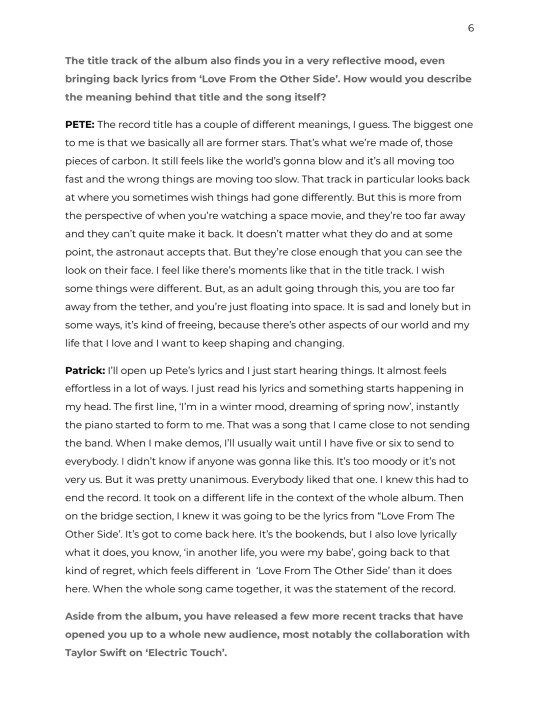
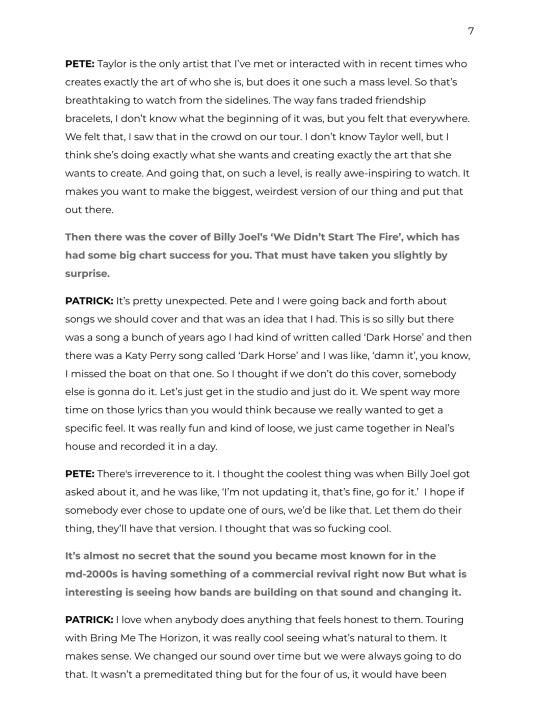
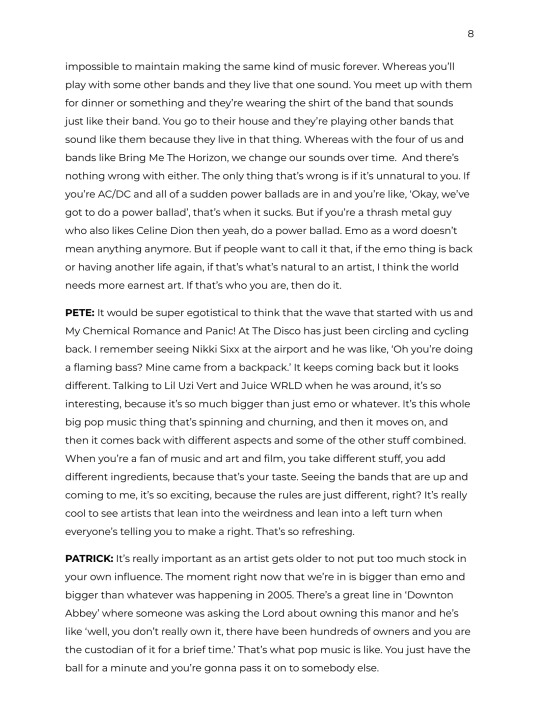
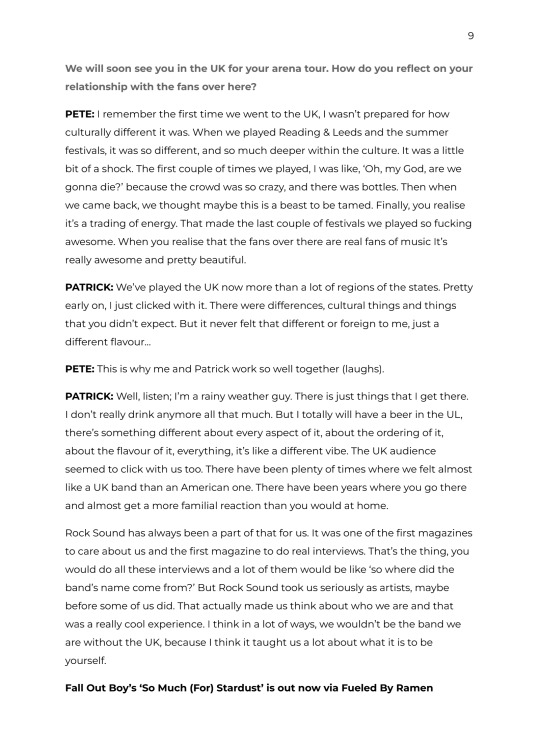
article in text below (and warning for long post.)
Rock Sound Issue #300
WHAT A TIME TO BE ALIVE
WITH THE TRIUMPHANT ‘SO MUCH (FOR) STARDUST’ CAPTURING A WHOLE NEW GENERATION OF FANS, FALL OUT BOY ARE RIDING HIGH, CELEBRATING THEIR PAST WHILE LOOKING TOWARDS A BRIGHT FUTURE. PETE WENTZ AND PATRICK STUMP REFLECT ON RECENT SUCCESSES AND THE LESSONS LEARNED FROM TWO DECADES OF WRITING AND PERFORMING TOGETHER.
WORDS: James Wilson-Taylor
PHOTOS: Elliott Ingham
You have just completed a US summer tour that included stadium shows and some of your most ambitious production to date. What were your aims going into this particular show?
PETE: Playing stadiums is a funny thing. I pushed pretty hard to do a couple this time because I think that the record Patrick came up with musically lends itself to that feeling of being part of something larger than yourself. When we were designing the cover to the album, it was meant to be all tangible, which was a reaction to tokens and skins that you can buy and avatars. The title is made out of clay, and the painting is an actual painting. We wanted to approach the show in that way as well. We've been playing in front of a gigantic video wall for the past eight years. Now, we wanted a stage show where you could actually walk inside it.
Did adding the new songs from ‘So Much (For) Stardust’ into the setlist change the way you felt about them?
PATRICK: One of the things that was interesting about the record was that we took a lot of time figuring out what it was going to be, what it was going to sound like. We experimented with so many different things. I was instantly really proud. I felt really good about this record but it wasn’t until we got on stage and you’re playing the songs in between our catalogue that I really felt that. It was really noticeable from the first day on this tour - we felt like a different band. There's a new energy to it. There was something that I could hear live that I couldn't hear before.
You also revisited a lot of older tracks and b-sides on this tour, including many from the ‘Folie à Deux’-era. What prompted those choices?
PETE: There were some lean years where there weren't a lot of rock bands being played on pop radio or playing award shows so we tried to play the biggest songs, the biggest versions of them. We tried to make our thing really airtight, bulletproof so that when we played next to whoever the top artist was, people were like, ‘oh yeah, they should be here.’ The culture shift in the world is so interesting because now, maybe rather than going wider, it makes more sense to go deeper with people. We thought about that in the way that we listen to music and the way we watch films. Playing a song that is a b-side or barely made a record but is someone’s favourite song makes a lot of sense in this era.
PATRICK: I think there also was a period there where, to Pete’s point, it was a weird time to be a rock band. We had this very strange thing that happened to us, and not a lot of our friends for some reason, where we had a bunch of hits, right? And it didn’t make any sense to me. It still doesn’t make sense to me. But there was a kind of novelty, where we could play a whole set of songs that a lot of people know. It was fun and rewarding for us to do that. But then you run the risk of playing the same set forever. I want to love the songs that we play. I want to care about it and put passion into what we do. And there’s no sustainable way to just do the same thing every night and not get jaded. We weren’t getting there but I really wanted to make sure that we don’t ever get there.
PETE: In the origin of Fall Out Boy, what happened at our concerts was we knew how to play five songs really fast and jumped off walls and the fire marshal would shut it down. It was what made the show memorable, but we wanted to be able to last and so we tried to perfect our show and the songs and the stage show and make it flawless. Then you don’t really know how much spontaneity you want to include, because something could go wrong. When we started this tour, and we did a couple of spontaneous things, it opened us up to more. Because things did go wrong and that’s what made the show special. We’re doing what is the most punk rock version of what we could be doing right now.
You seem generally a lot more comfortable celebrating your past success at this point in your career.
PETE: I think it’s actually not a change from our past. I love those records, but I never want to treat them in a cynical way. I never want there to be a wink and a smile where we’re just doing this because it’s the anniversary. This was us celebrating these random songs and we hope people celebrate them with us. There was a purity to it that felt in line with how we’ve always felt about it. I love ‘Folie à Deux’ - out of any Fall Out Boy record that's probably the one I would listen to. But I just never wanted it to be done in a cynical way, where we feel like we have to. But celebrating it in a way where there’s the purity of how we felt when we wrote the song originally. I think that’s fucking awesome.
PATRICK: Music is a weird art form. Because when you’re an actor and you play a character, that is a specific thing. James Bond always wears a suit and has a gun and is a secret agent. If you change one thing, that’s fine, but you can’t really change all of it. But bands are just people. You are yourself. People get attached to it like it’s a story but it’s not. That was always something I found difficult. For the story, it’s always good to say, ‘it’s the 20th anniversary, let’s go do the 20th anniversary tour’, that’s a good story thing. But it’s not always honest. We never stopped playing a lot of the songs from ‘Take This To Your Grave’, right? So why would I need to do a 20-year anniversary and perform all the songs back to back? The only reason would be because it would probably sell a lot of tickets and I don’t really ever want to be motivated by that, frankly.
One of the things that’s been amazing is that now as the band has been around for a while, we have different layers of audience. I love ‘Folie à Deux’, I do, I love that record. But I had a really personally negative experience of touring on it. So that’s what I think of when I think of that record initially. It had to be brought back to me for me to appreciate it, for me to go, ‘oh, this record is really great. I should be happy with this. I should want to play this,’ So that’s why we got into a lot of the b-sides because we realised that our perspectives on a lot of these songs were based in our feelings and experiences from when we were making them. But you can find new experiences if you play those songs. You can make new memories with them.
You alluded there to the 20th anniversary of ‘Take This To Your Grave’. Obviously you have changed and developed as a band hugely since then. But is there anything you can point to about making that debut record that has remained a part of your process since then?
PETE: We have a language, the band, and it’s definitely a language of cinema and film. That’s maintained through time. We had very disparate music tastes and influences but I think film was a place we really aligned. You could have a deep discussion, because none of us were filmmakers. You could say which part was good and which part sucked and not hurt anybody’s feelings, because you weren’t going out to make a film the next day. Whereas with music, I think if we’d only had that to talk about, we would have turned out a different band.
PATRICK: ‘Take This To Your Grave’, even though it’s absolutely our first record, there’s an element of it that’s still a work in progress. It is still a band figuring itself out. Andy wasn’t even officially in the band for half of the recording, right? I wasn’t even officially the guitar player for half of the recording. We were still bumbling through it. There was something that popped up a couple times throughout the record where you got these little inklings of who the band really was. We really explored that on ‘From Under the Cork Tree’’. So when we talk about what has remained the same… I didn’t want to be a singer, I didn’t know anything about singing, I wasn’t playing on that. I didn’t even plan to really be in this band for that long because Pete had a real band that really toured so I thought this was gonna be a side project. So there’s always been this element within the band where I don’t put too many expectations on things and then Pete has this really big ambition, creatively. There’s this great interplay between the tour of us where I’m kind of oblivious, and I don’t know when I’m putting out a big idea and Pete has this amazing vision to find what goes where. There’s something really magical about that because I never could have done a band like this without it. We needed everybody, we needed all four of us. And I think that’s the thing that hasn’t changed - the four of us just being ourselves and trying to figure things out. Listening back to ‘Folie’ or ‘Infinity On High’ or ‘American Beauty’. I’m always amazed at how much better they are than I remember. I listened to ‘MANIA’ the other day. I have a lot of misgivings about that record, a lot of things I’m frustrated about. But then I’m listening to it and I’m like, ‘this is pretty good.’ There’s a lot of good things in there. I don’t know why, it’s kind of like you can’t see those things. It’s kind of amazing to have Pete be able to see those things. And likewise, sometimes Pete has no idea when he writes something brilliant, as a lyricist, and I have to go, ‘No, I’m gonna keep that one, I’m gonna use that.’
On ‘So Much (For) Stardust’ you teamed up with producer Neal Avron again for the first time since 2008. Given how much time has passed, did it take a minute to reestablish that connection or did you pick up where you left off?
PATRICK: It really didn’t feel like any time had passed between us and Neal. It was pretty seamless in terms of working with him. But then there was also the weird aspect where the last time we worked with him was kind of contentious. Interpersonally, the four of us were kind of fighting with each other…as much as we do anyway. We say that and then that myth gets built bigger than it was. We were always pretty cool with each other. It’s just that the least cool was making ‘Folie’. So then getting into it again for this record, it was like no time had passed as people but the four of us got on better so we had more to bring to Neal.
PETE: It’s a little bit like when you return to your parents’ house for the holiday break when you’re in college. It’s the same house but now I can drink with my parents. We’d grown up and the first times we worked with Neal, he had to do so much more boy scout leadership, ‘you guys are all gonna be okay, we’re gonna do this activity to earn this badge so you guys don’t fucking murder each other.’ This time, we probably got a different version of Neal that was even more creative, because he had to do less psychotherapy.
He went deep too. Sometimes when you��re in a session with somebody, and they’re like, ‘what are we singing about?’, I’ll just be like, ‘stuff’. He was not cool with ‘stuff’. I would get up and go into the bathroom outside the studio and look in the mirror, and think ‘what is it about? How deep are we gonna go?’ That’s a little bit scarier to ask yourself. If last time Neal was like a boy scout leader, this time, it was more like a Sherpa. He was helping us get to the summit.
The title track of the album also finds you in a very reflective mood, even bringing back lyrics from ‘Love From the Other Side’. How would you describe the meaning behind that title and the song itself?
PETE: The record title has a couple of different meanings, I guess. The biggest one to me is that we basically all are former stars. That’s what we’re made of, those pieces of carbon. It still feels like the world’s gonna blow and it’s all moving too fast and the wrong things are moving too slow. That track in particular looks back at where you sometimes wish things had gone differently. But this is more from the perspective of when you’re watching a space movie, and they’re too far away and they can’t quite make it back. It doesn’t matter what they do and at some point, the astronaut accepts that. But they’re close enough that you can see the look on their face. I feel like there’s moments like that in the title track. I wish some things were different. But, as an adult going through this, you are too far away from the tether, and you’re just floating into space. It is sad and lonely but in some ways, it’s kind of freeing, because there’s other aspects of our world and my life that I love and I want to keep shaping and changing.
Patrick: I’ll open up Pete’s lyrics and I just start hearing things. It almost feels effortless in a lot of ways. I just read his lyrics and something starts happening in my head. The first line, ‘I’m in a winter mood, dreaming of spring now’, instantly the piano started to form to me. That was a song that I came close to not sending the band. When I make demos, I’ll usually wait until I have five or six to send to everybody. I didn’t know if anyone was gonna like this. It’s too moody or it’s not very us. But it was pretty unanimous. Everybody liked that one. I knew this had to end the record. It took on a different life in the context of the whole album. Then on the bridge section, I knew it was going to be the lyrics from “Love From The Other Side’. It’s got to come back here. It’s the bookends, but I also love lyrically what it does, you know, ‘in another life, you were my babe’, going back to that kind of regret, which feels different in ‘Love From The Other Side’ than it does here. When the whole song came together, it was the statement of the record.
Aside from the album, you have released a few more recent tracks that have opened you up to a whole new audience, most notably the collaboration with Taylor Swift on ‘Electric Touch’.
PETE: Taylor is the only artist that I’ve met or interacted with in recent times who creates exactly the art of who she is, but does it one such a mass level. So that’s breathtaking to watch from the sidelines. The way fans traded friendship bracelets, I don’t know what the beginning of it was, but you felt that everywhere. We felt that, I saw that in the crowd on our tour. I don’t know Taylor well, but I think she’s doing exactly what she wants and creating exactly the art that she wants to create. And going that, on such a level, is really awe-inspiring to watch. It makes you want to make the biggest, weirdest version of our thing and put that out there.
Then there was the cover of Billy Joel’s ‘We Didn’t Start The Fire’, which has had some big chart success for you. That must have taken you slightly by surprise.
PATRICK: It’s pretty unexpected. Pete and I were going back and forth about songs we should cover and that was an idea that I had. This is so silly but there was a song a bunch of years ago I had kind of written called ‘Dark Horse’ and then there was a Katy Perry song called ‘Dark Horse’ and I was like, ‘damn it’, you know, I missed the boat on that one. So I thought if we don’t do this cover, somebody else is gonna do it. Let’s just get in the studio and just do it. We spent way more time on those lyrics than you would think because we really wanted to get a specific feel. It was really fun and kind of loose, we just came together in Neal’s house and recorded it in a day.
PETE: There's irreverence to it. I thought the coolest thing was when Billy Joel got asked about it, and he was like, ‘I’m not updating it, that’s fine, go for it.’ I hope if somebody ever chose to update one of ours, we’d be like that. Let them do their thing, they’ll have that version. I thought that was so fucking cool.
It’s almost no secret that the sound you became most known for in the md-2000s is having something of a commercial revival right now But what is interesting is seeing how bands are building on that sound and changing it.
PATRICK: I love when anybody does anything that feels honest to them. Touring with Bring Me The Horizon, it was really cool seeing what’s natural to them. It makes sense. We changed our sound over time but we were always going to do that. It wasn’t a premeditated thing but for the four of us, it would have been impossible to maintain making the same kind of music forever. Whereas you’ll play with some other bands and they live that one sound. You meet up with them for dinner or something and they’re wearing the shirt of the band that sounds just like their band. You go to their house and they’re playing other bands that sound like them because they live in that thing. Whereas with the four of us and bands like Bring Me The Horizon, we change our sounds over time. And there’s nothing wrong with either. The only thing that’s wrong is if it’s unnatural to you. If you’re AC/DC and all of a sudden power ballads are in and you’re like, ‘Okay, we’ve got to do a power ballad’, that’s when it sucks. But if you’re a thrash metal guy who also likes Celine Dion then yeah, do a power ballad. Emo as a word doesn’t mean anything anymore. But if people want to call it that, if the emo thing is back or having another life again, if that’s what’s natural to an artist, I think the world needs more earnest art. If that’s who you are, then do it.
PETE: It would be super egotistical to think that the wave that started with us and My Chemical Romance and Panic! At The Disco has just been circling and cycling back. I remember seeing Nikki Sixx at the airport and he was like, ‘Oh you’re doing a flaming bass? Mine came from a backpack.’ It keeps coming back but it looks different. Talking to Lil Uzi Vert and Juice WRLD when he was around, it’s so interesting, because it’s so much bigger than just emo or whatever. It’s this whole big pop music thing that’s spinning and churning, and then it moves on, and then it comes back with different aspects and some of the other stuff combined. When you’re a fan of music and art and film, you take different stuff, you add different ingredients, because that’s your taste. Seeing the bands that are up and coming to me, it’s so exciting, because the rules are just different, right? It’s really cool to see artists that lean into the weirdness and lean into a left turn when everyone’s telling you to make a right. That’s so refreshing.
PATRICK: It’s really important as an artist gets older to not put too much stock in your own influence. The moment right now that we’re in is bigger than emo and bigger than whatever was happening in 2005. There’s a great line in ‘Downton Abbey’ where someone was asking the Lord about owning this manor and he’s like ‘well, you don’t really own it, there have been hundreds of owners and you are the custodian of it for a brief time.’ That’s what pop music is like. You just have the ball for a minute and you’re gonna pass it on to somebody else.
We will soon see you in the UK for your arena tour. How do you reflect on your relationship with the fans over here?
PETE: I remember the first time we went to the UK, I wasn’t prepared for how culturally different it was. When we played Reading & Leeds and the summer festivals, it was so different, and so much deeper within the culture. It was a little bit of a shock. The first couple of times we played, I was like, ‘Oh, my God, are we gonna die?’ because the crowd was so crazy, and there was bottles. Then when we came back, we thought maybe this is a beast to be tamed. Finally, you realise it’s a trading of energy. That made the last couple of festivals we played so fucking awesome. When you realise that the fans over there are real fans of music It’s really awesome and pretty beautiful.
PATRICK: We’ve played the UK now more than a lot of regions of the states. Pretty early on, I just clicked with it. There were differences, cultural things and things that you didn’t expect. But it never felt that different or foreign to me, just a different flavour…
PETE: This is why me and Patrick work so well together (laughs).
PATRICK: Well, listen; I’m a rainy weather guy. There is just things that I get there. I don’t really drink anymore all that much. But I totally will have a beer in the UL, there’s something different about every aspect of it, about the ordering of it, about the flavour of it, everything, it’s like a different vibe. The UK audience seemed to click with us too. There have been plenty of times where we felt almost like a UK band than an American one. There have been years where you go there and almost get a more familial reaction than you would at home.
Rock Sound has always been a part of that for us. It was one of the first magazines to care about us and the first magazine to do real interviews. That’s the thing, you would do all these interviews and a lot of them would be like ‘so where did the band’s name come from?’ But Rock Sound took us seriously as artists, maybe before some of us did. That actually made us think about who we are and that was a really cool experience. I think in a lot of ways, we wouldn’t be the band we are without the UK, because I think it taught us a lot about what it is to be yourself.
Fall Out Boy’s ‘So Much (For) Stardust’ is out now via Fueled By Ramen
#fall out boy#fob#tourdust#pete wentz#patrick stump#fob interview#so much for stardust#smfs era#your unemployed friend at 2pm on a monday:#anyways. hope this is helpful i loved the interview!
96 notes
·
View notes